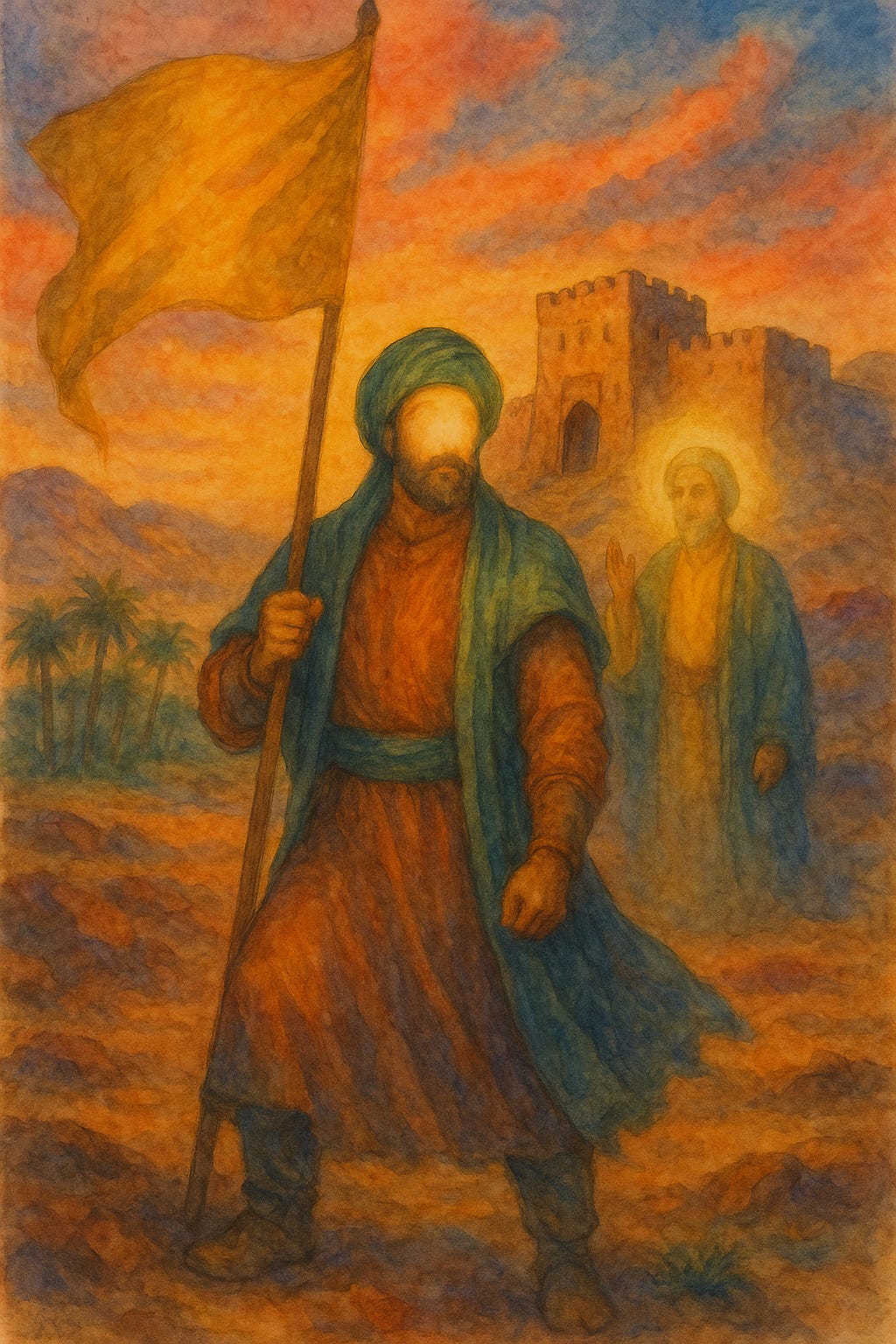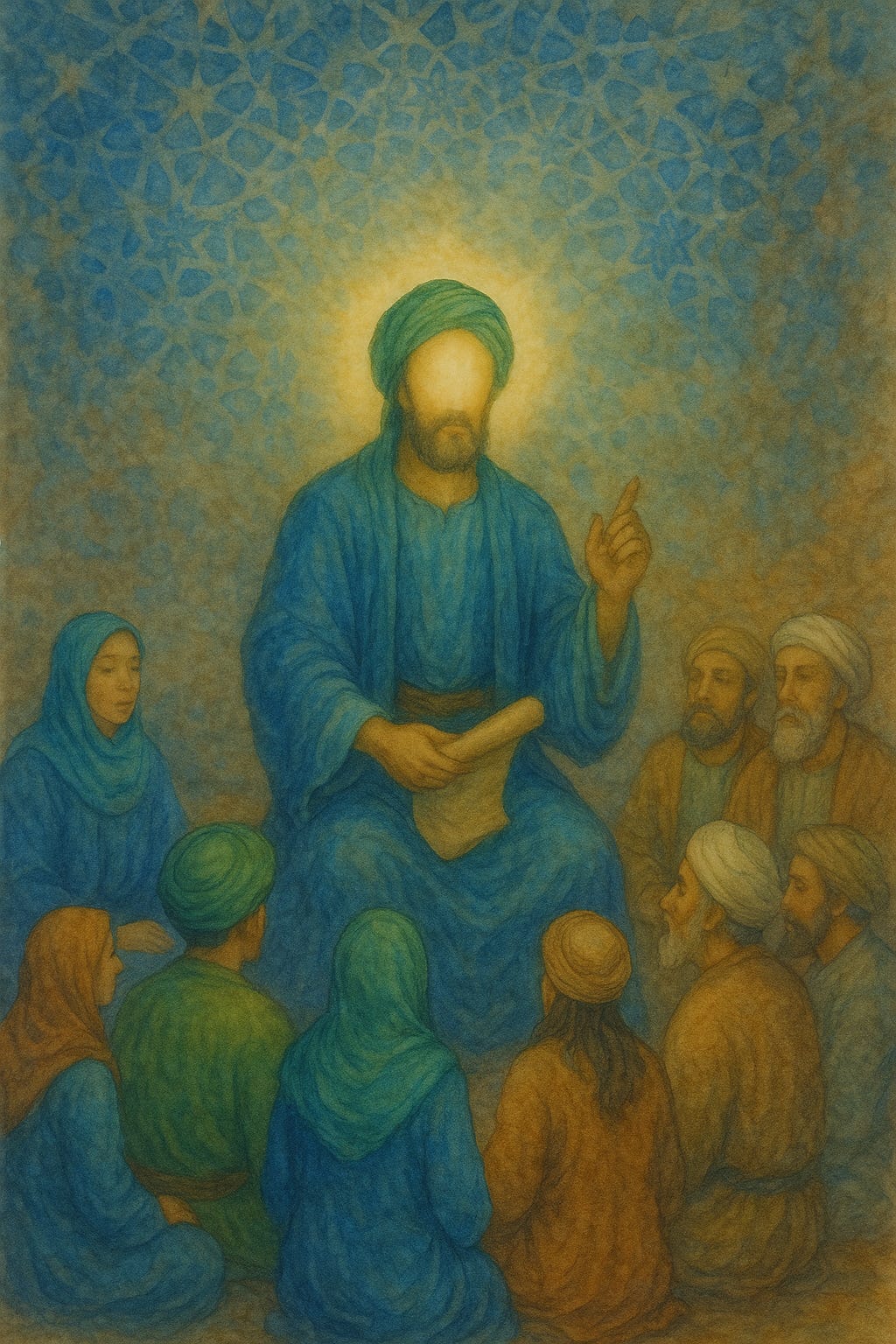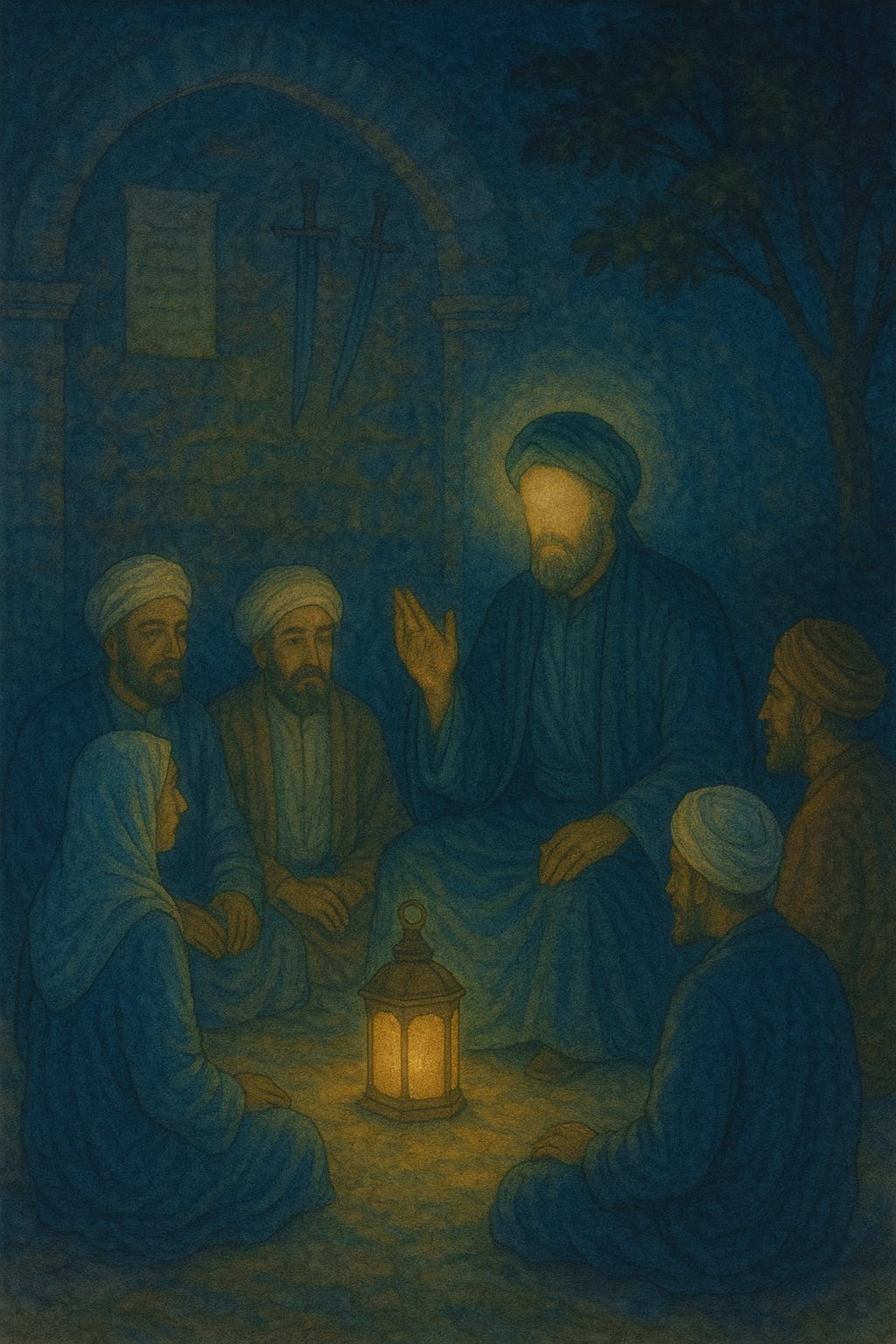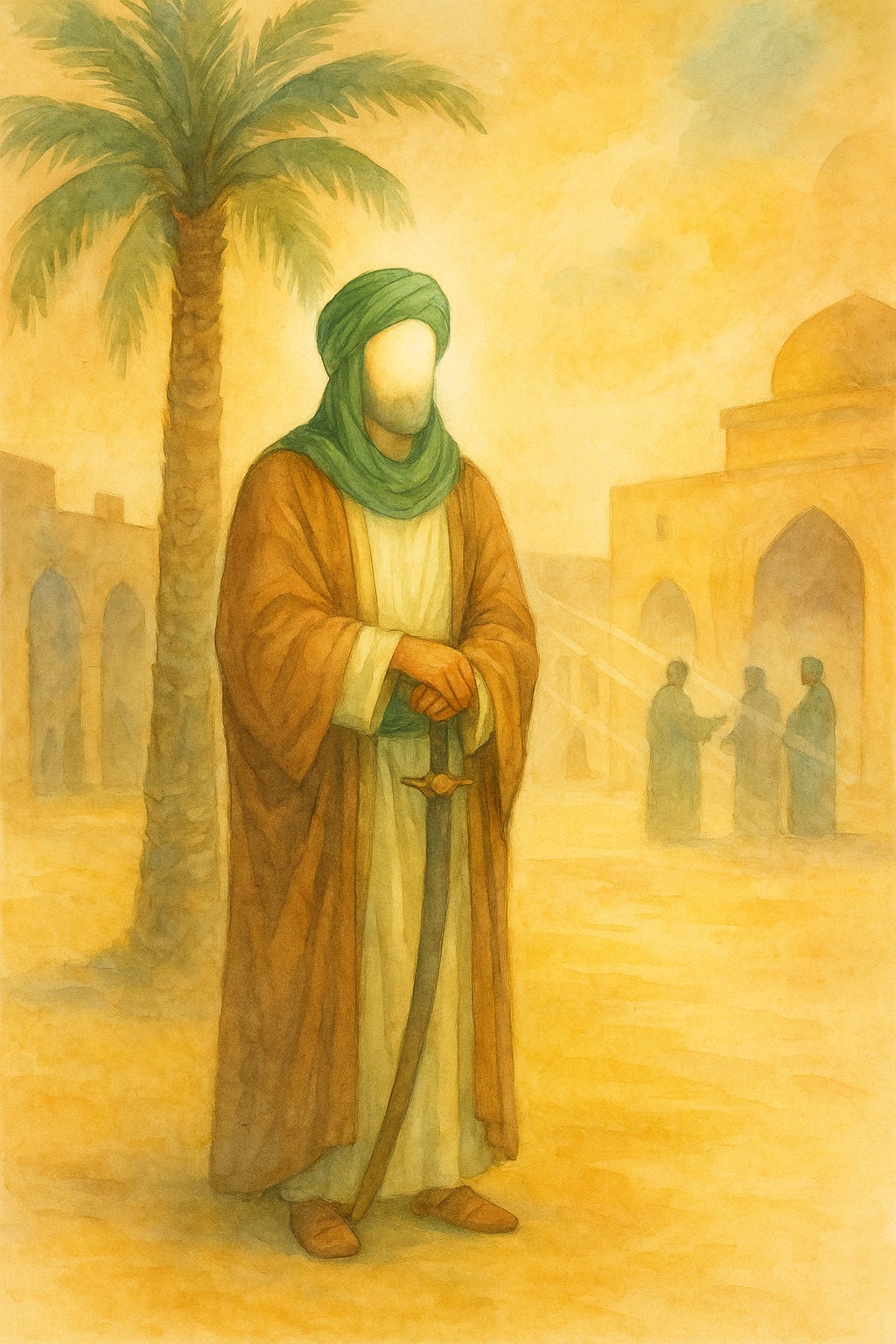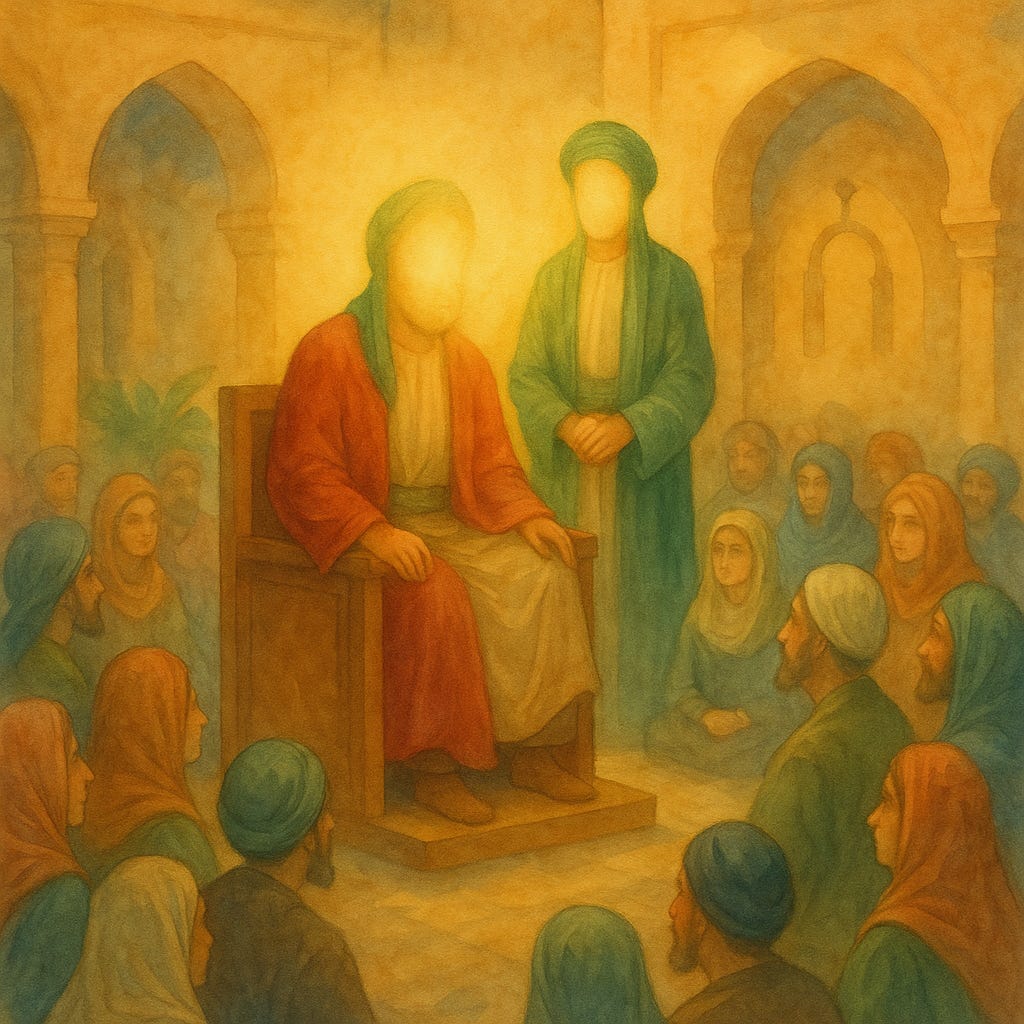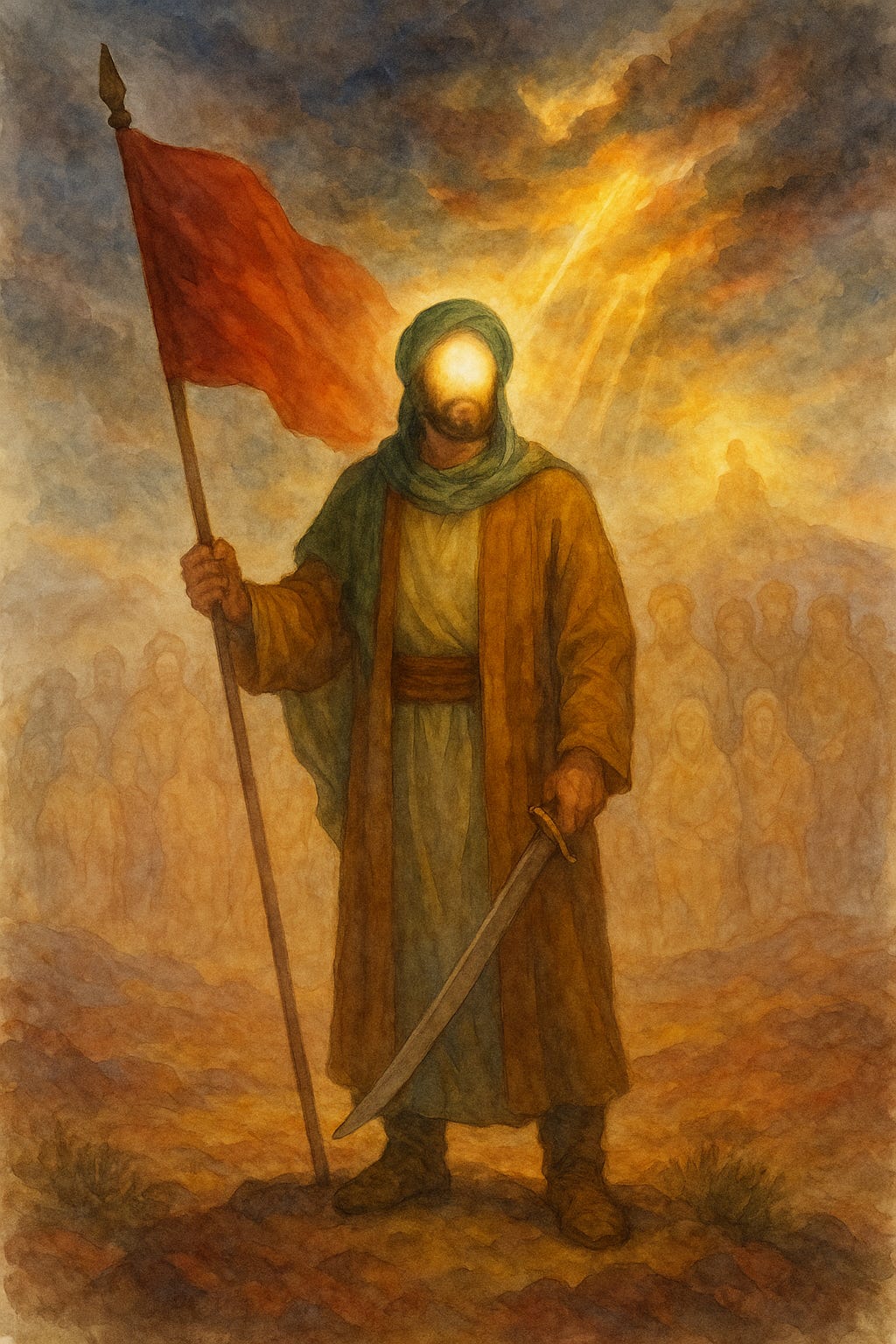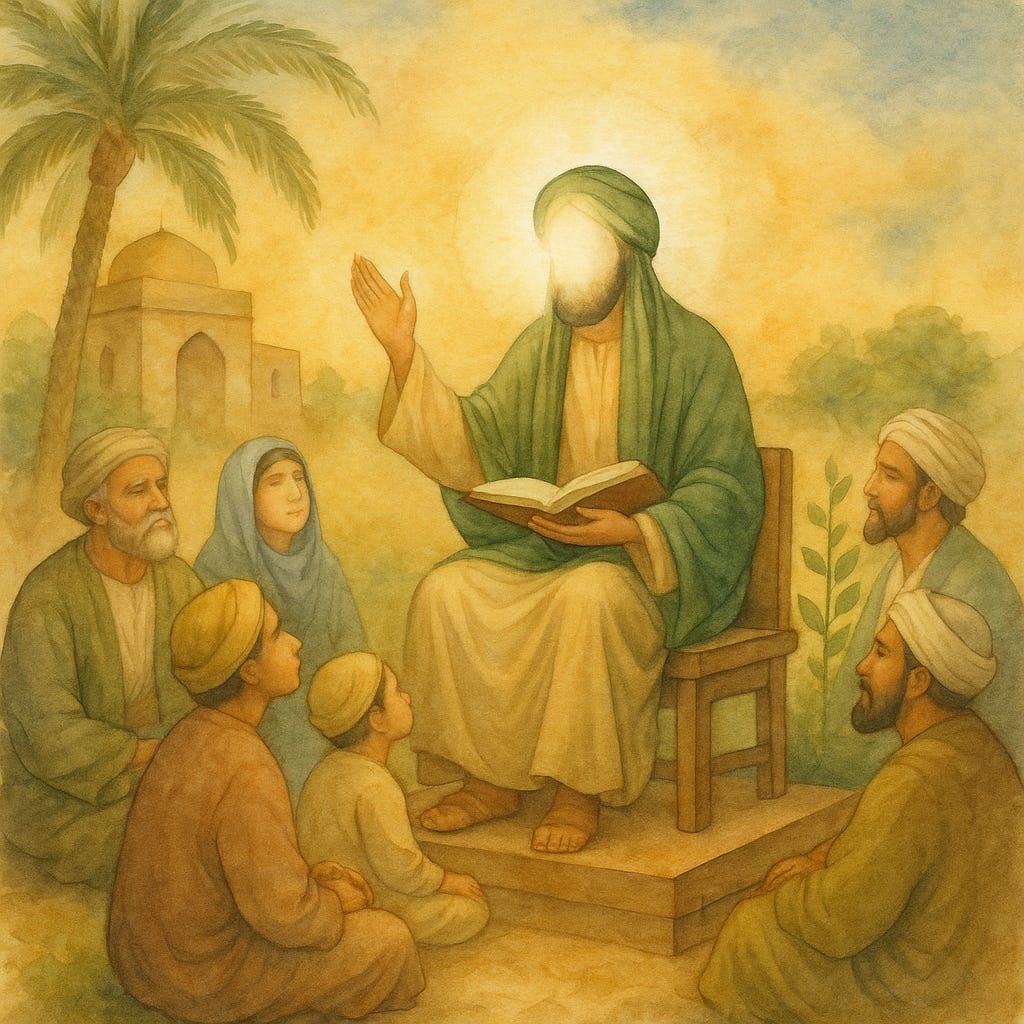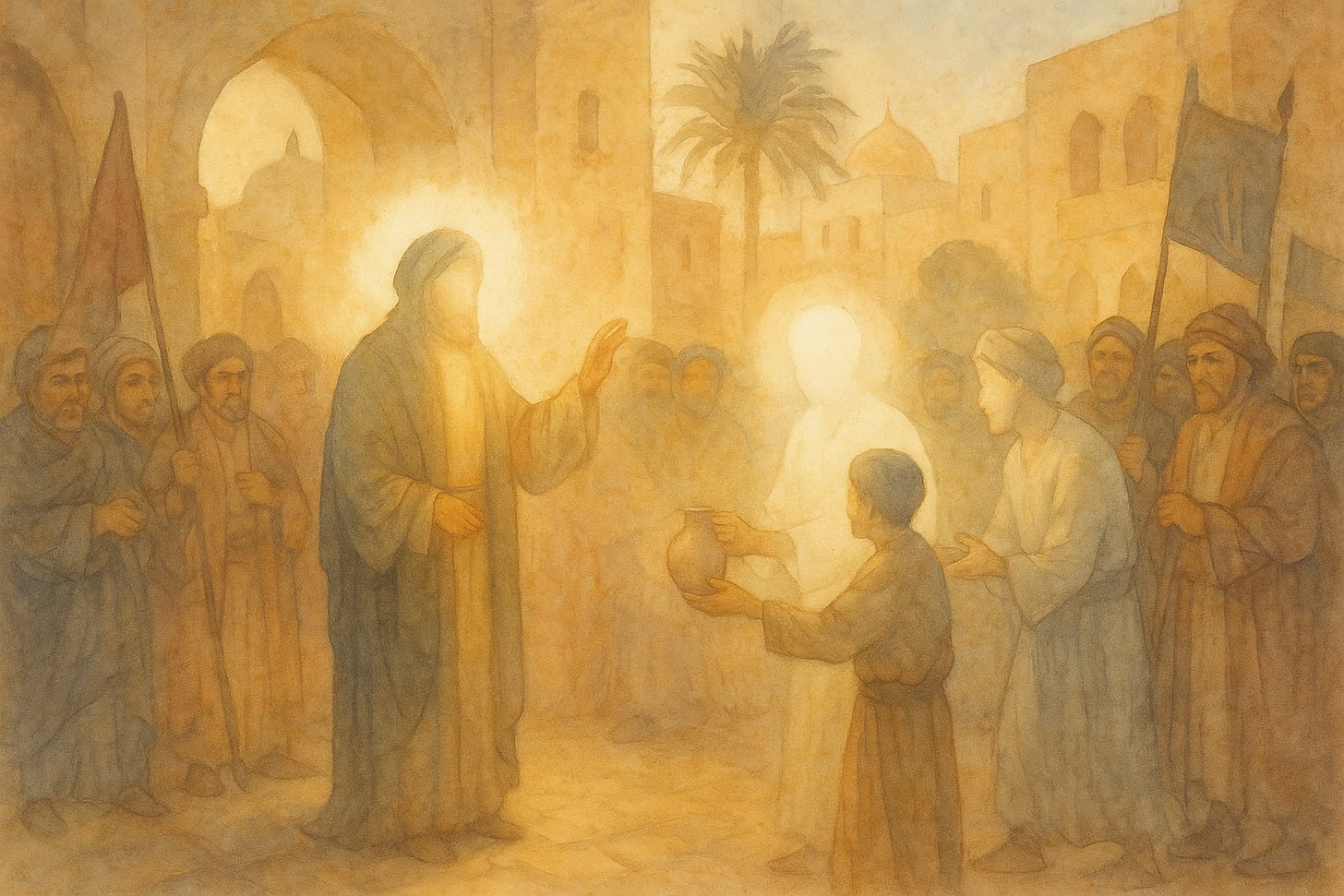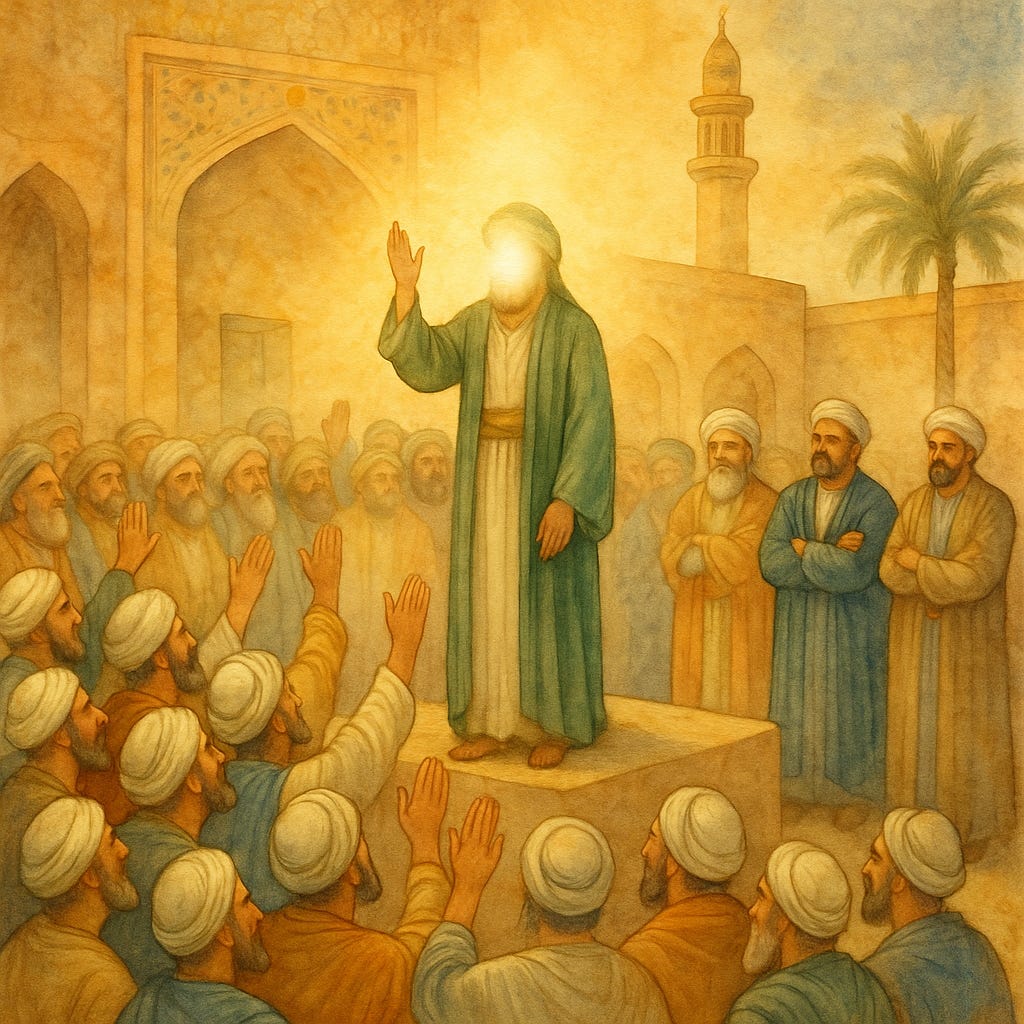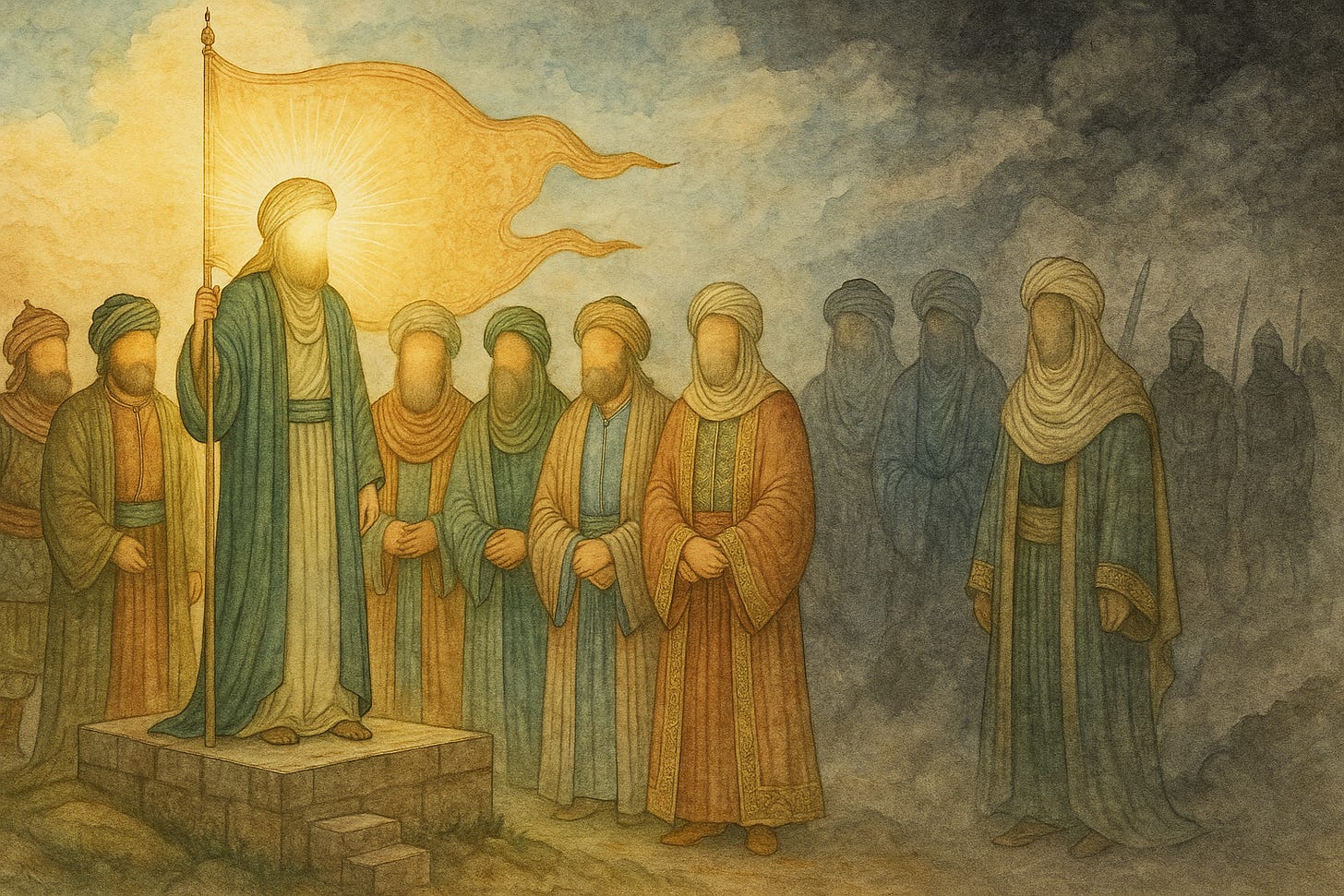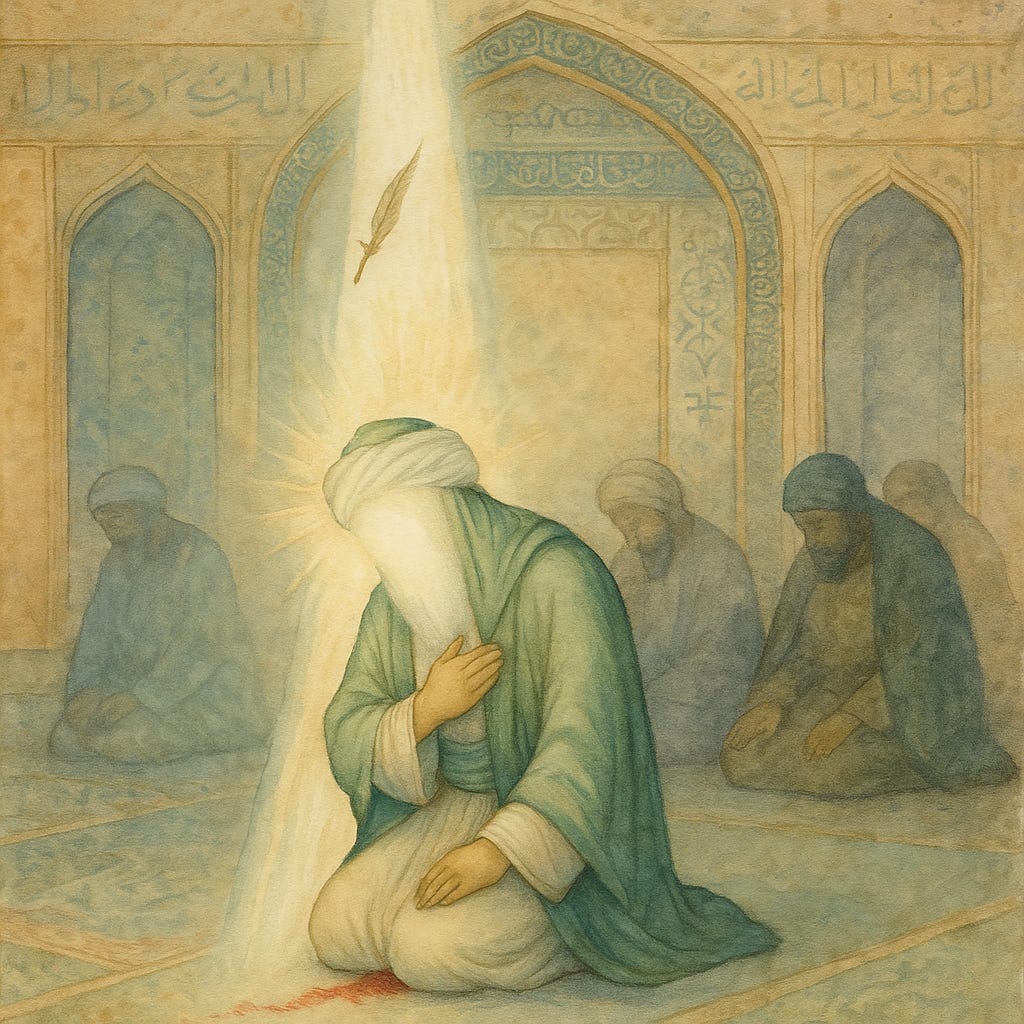[24] Imamah (Leadership) - The Commander of the Faithful, Imam Ali
A series of discussions on the teachings of Imam Sadiq (sixth Imam of the Muslims), from the book Misbah ash-Sharia (The Lantern of the Path)
In His Name, the Most High
This is part twenty-four of an ongoing series of discussions on the book attributed to Imam as-Sadiq entitled ‘Misbah ash-Sharia’ (the Lantern of the Path).
As is the case for each of the sessions in this series (and previous series), there is a requirement for the reader to at the very least take a cursory look at the previous sessions - though studying them properly is more beneficial - as the nature of this subject matter requires a building up of understanding in a step by step manner.
Since each session builds on the one before, it is crucial that the previous sessions are studied - at least in a cursory manner, though fully is more beneficial - so we can try to ensure that misunderstandings and confusion do not ensue, as well as ensure we can garner more understanding from each session.
The previous parts can be found here:
Video of the Majlis (Sermon/Lecture)
This write up is a companion to the video majlis (sermon/lecture) found below:
Contents
Majlis - Misbah ash-Sharia - Servitude - Part 24 - Imamah - The Commander of the Faithful, Imam Ali
Nasheed - Ba Ehteram, Baba Salaam (With Great Respect, Greetings Father)
Ziyarah - Ziyarat Aal-i-Yaseen
Recap
In the previous session — the twenty-third in our journey through Misbah ash-Sharia (The Lantern of the Path) — we took a necessary and foundational detour to revisit the life, mission, and legacy of the Prophet Muhammad (peace and blessings be upon him and his family), in order to establish the correct frame through which the subject of Imamah must be understood.
We reflected on how the Prophet’s mission was not simply to deliver divine truths, but to establish a lived reality of tawheed — an actual society rooted in justice, knowledge, purity, and divine sovereignty. His Prophethood was both inner and outer jihad: a constant struggle against the corruption of the age, the ignorance of the people, and the internal diseases of the soul.
The establishment of this new society required immense patience, unshakable resolve, and complete submission to divine command. From the early days of persecution in Makkah, through the migration to Madinah, and into the period of Islamic statecraft — every phase of the Prophet’s life was a model of comprehensive leadership: spiritual, ethical, social, and political.
We explored how the Prophet dealt with five categories of threat: the external tribal raiders, the Quraysh elite, the hostile factions within the Jewish tribes, the hypocrites embedded within the community, and the most dangerous of all — the inner nafs. His method throughout was one of divine sincerity, strategic wisdom, and absolute commitment to justice.
Of particular importance in this session was the conquest of Khaybar — a pivotal event that publicly and spiritually established the unique position of Imam Ali (peace be upon him). We recalled the Prophet’s declaration that he would give the standard to one whom “God and His Messenger love, and who loves God and His Messenger” — and how this declaration, followed by the miraculous healing and the decisive victory brought by Imam Ali, became a clear sign of the divine selection and the rightful continuity of Prophetic mission through the Imams.
This return to the life of the Prophet was not a repetition, but a deepening — so that as we now prepare to walk the path of the 250-year-old person, beginning with the Commander of the Faithful himself, we do so with clarity, reverence, and a proper sense of historical and theological grounding.
For it is from the life of the Prophet that all else springs — and only by understanding the trunk can one truly appreciate the branches.
In the name of the Lord of Muhammad and Ali, we proceed …
Imamah (Leadership) - The Commander of the Faithful, Imam Ali
The Divine Mandate of Imamah
In Shia Islam, Imamah signifies the divinely ordained leadership indispensable for guiding the Muslim Community (ummah) following the departure of the Seal of the Prophets, Prophet Muhammad, may the peace and blessings of God be upon him and his family.
Imamah transcends the realm of mere political necessity, which arises from the fallibility of human societies; rather, it is a foundational pillar of faith, instituted by the will of God Himself.
The nature of this leadership is unequivocally delineated in Islam: the Imam must be a soul suffused with divine grace (tawfeeq) and guidance (hidayah), endowed with profound, God-given knowledge (ilm) to distinguish truth from falsehood, and manifesting a strength (quwwah) rooted in righteousness and moral clarity.
This divine strength echoes in the Quranic address to Prophet Yahya (John the Baptist):
يَا يَحْيَىٰ خُذِ الْكِتَابَ بِقُوَّةٍ ۖ وَآتَيْنَاهُ الْحُكْمَ صَبِيًّا
O John!’ [We said,] ‘Hold on with power to the Book!’ And We gave him judgement while still a child
— Quran, Surah Maryam (the Chapter of Saint Mary) #19, Verse #12
The Imam, as the divinely appointed leader, must be free of personal caprice, his priority ever fixed upon the spiritual and temporal welfare of the community.
The Commander of the Faithful, Imam Ali — Amir al-Mumineen — embodied this station during his caliphate.
Though his rule was brief in duration, it remains an eternal paradigm, a living testament to the ideals of divinely guided governance. The momentous event of Ghadir Khumm, wherein the Prophet appointed Imam Ali as his successor, stands as the bedrock upon which the doctrine of Imamah finds continuity and permanence.
Defining the Imam in Shia Theology
Though the term Imam lexically denotes a “leader,” its significance within Islamic discourse — particularly in the aftermath of the Prophet’s demise and the ensuing divisions within the ummah — assumed a precise theological meaning.
Within Shia terminology, Imamah denotes not merely temporal or intellectual leadership, but the possession of comprehensive divine authority. While the Quran may at times employ the term in a broader sense, the Shia conception — drawn from the teachings of the Prophet and the Ahl al-Bayt (peace be upon them all) — defines the Imam through specific, divinely ordained attributes and functions.
Essential Qualifications of the Imam
In the Shia worldview, the Imam is not selected by the community through consultation or consensus; he is divinely designated (al-nass) — either directly by the Prophet or by the preceding Imam.
This appointment entails specific prerequisites, without which legitimate Imamate is untenable. These include:
Infallibility (al-ismah): Immunity from sin and error, particularly in religious judgement and divine representation.
Divine Knowledge (ilm al-ladduni): A God-bestowed mastery over the Quran, Sunnah, and all facets of religion.
Moral and Spiritual Perfection: A character of exemplary virtue and purity, unmarred by any defect that may hinder divine leadership.
Pure Lineage: Descent from the sanctified progeny of the Prophet — the Ahl al-Bayt.
While others may adopt the title of ‘Imam’ for political rulers, the Shia definition insists upon these divinely stipulated conditions.
The true Imam is a spiritual authority, a paragon of moral rectitude, and a luminous guide whose appointment flows directly from divine will.
Absent these essential qualities, no worldly claim to leadership bears the seal of legitimacy in the eyes of God.
The Comprehensive Role of the Imam
The Shia understanding of Imamah is not partial but integrative, encompassing three indispensable dimensions:
Political Leadership: To establish justice and institute a righteous order.
Religious Instruction: To preserve and interpret the authentic message of Islam.
Spiritual Edification (at-tazkiyyah): To nurture hearts and guide souls towards divine proximity.
These dimensions are inseparable and coexistent. The Prophet Muhammad was the embodiment of all three.
The Shia belief holds that this complete authority was transferred through divine designation (al-nass) to Imam Ali, and subsequently to his appointed successors.
This contrasts with views that isolate political rule from spiritual guidance. In the Shia perspective, the Imam is God’s representative in every sphere of human life.
Textual Basis for Imamah
The claim that the doctrine of Imamah lacks textual evidence is unfounded.
The Quran and Prophetic traditions abound with proofs supporting its legitimacy. One of the most illuminating traditions is narrated from Imam Ali ibn Musa al-Ridha, the eighth Imam of the Muslims, recorded in al-Kāfī:
الإِمَامَةُ زِمَامُ الدِّينِ، وَنِظَامُ الْمُسْلِمِينَ، وَصَلاَحُ الدُّنْيَا، وَعِزُّ الْمُؤْمِنِينَ.
الإِمَامُ يُحِلُّ حَلَالَ اللَّهِ، وَيُحَرِّمُ حَرَامَ اللَّهِ، وَيُقِيمُ حُدُودَ اللَّهِ، وَيَذُبُّ عَنْ دِينِ اللَّهِ، وَيَدْعُو إِلَى سَبِيلِ رَبِّهِ بِالْحِكْمَةِ وَالْمَوْعِظَةِ الْحَسَنَةِ، وَالْحُجَّةِ الْبَالِغَةِ.
“Imamah is the rein of the religion, the order of the Muslims, the rectitude of the world, and the honour of the believers… It is through the Imam that prayer, zakat, fasting, Hajj, and jihad are perfected; spoils and charities are administered, divine punishments and legal rulings are upheld, and the frontiers are protected… The Imam permits what God has permitted, forbids what God has forbidden, enforces the limits of God, defends His religion, and invites to the path of his Lord with wisdom, beautiful admonition, and compelling proof.”
— Al-Kulayni, al-Kafi, Vol. 1, Kitab al-Hujjah (the Book of Divine Proof), Chapter: “The Necessity of the Hujjah and His Description”
Imam Jaʿfar al-Sadiq further confirmed that the Imams possess all the mandates required for divine leadership. One pivotal Quranic verse, interpreted within Shia tradition to refer specifically to the Imams, states:
يَا أَيُّهَا الَّذِينَ آمَنُوا أَطِيعُوا اللَّهَ وَأَطِيعُوا الرَّسُولَ وَأُولِي الْأَمْرِ مِنكُمْ ۖ فَإِن تَنَازَعْتُمْ فِي شَيْءٍ فَرُدُّوهُ إِلَى اللَّهِ وَالرَّسُولِ إِن كُنتُمْ تُؤْمِنُونَ بِاللَّهِ وَالْيَوْمِ الْآخِرِ ۚ ذَٰلِكَ خَيْرٌ وَأَحْسَنُ تَأْوِيلًا
“O you who have faith! Obey God and obey the Apostle and those vested with authority among you. And if you dispute over anything, refer it to God and the Messenger, if you believe in God and the Last Day. That is best, and a most excellent determination.”
— Quran, Surah al-Nisa (the Chapter of The Women) #4, Verse #59
Numerous hadeeth — preserved in al-Kafi and classical exegetical (tafaseer) works — establish that “those vested with authority” (uli al-amr) are none other than the purified Ahl al-Bayt, divinely appointed to guide the believers in all dimensions of life.
Their message was nothing short of a call to re-establish this sacred order of divinely mandated leadership.
Imamah as Active Struggle
To portray the later Imams — from Imam Zayn al-Abedeen to Imam Hasan al-Askari — as passive scholars estranged from political engagement is a distortion of both history and theology.
Their lives bear witness to a sustained, adaptive struggle — whether through covert resistance, intellectual formation, nurturing devoted circles, or supporting just uprisings.
The theological premise of Imamah necessitates their continual opposition to illegitimate authority. It is inconceivable that those vested with divine guidance would silently acquiesce to tyranny.
Their resistance was often veiled, but never absent.
Divine Knowledge and the Duty to Act
A common objection arises:
“If the Imams knew they would not triumph politically,
why engage in struggle?”
The answer lies in the principle of divine duty (taklif).
Possessing divine foreknowledge does not negate the obligation to act. The Prophet foresaw the disobedience of the archers at the battle of Uhud, yet he commanded them.
He anticipated rejection in Ta’if, yet he proclaimed the message.
Imam Ali, knew of his impending martyrdom, yet he mobilised his forces against Muawiyyah.
The Imams, endowed with divine knowledge, were nonetheless bound to strive in fulfilment of their role — not for worldly gain, but to uphold the command of God and establish the proof upon His creation.
Their actions were not reactions to circumstance, but manifestations of divine mandate.
The Historical Progression of Imamah
The practical embodiment and enduring influence of Imamah, as articulated in Shia theology, began immediately following the passing of the Noble Prophet Muhammad, peace and blessings be upon him and his family, in the month of Safar, 11AH.
This divinely ordained leadership continued unbroken through the pure lineage of the Ahl al-Bayt until the martyrdom of Imam al-Hasan al-Askari in Rabi al-Awwal, 260AH, and then it continues in a different form following the occultation of Imam al-Mahdi, may our souls be his ransom, and may God hasten his return.
This span of approximately two and a half centuries may be broadly delineated into distinct epochs, each characterised by the varying conditions and strategic responses of the Imams in the face of evolving political realities.
The First Era: Strategic Patience and Preservation (11AH – 35AH)
This formative period, extending for nearly twenty-five years from the demise of the Prophet until the beginning of the caliphate of Amir al-Mumineen, Imam Ali, was marked by a divinely inspired policy of restraint and endurance.
The nascent Muslim polity stood vulnerable to external threats, and any internal schism could have endangered the very survival of the Islamic project.
Though deviations from the pristine teachings of Islam had begun to emerge, they had not yet reached a threshold warranting open confrontation.
Imam Ali, as the divinely appointed guardian of the faith and most knowledgeable of the community, prioritised the unity of the Ummah over immediate assertion of authority. This approach, it is believed, was in accordance with the counsel of the Prophet himself, who had forewarned him of the necessity of patience (sabr) under certain circumstances.
Imam Ali alludes to this divine strategy in a letter addressed to the people of Egypt, explaining his initial restraint and his eventual decision to rise in defence of Islam:
فَأَمْسَكْتُ يَدِي حَتَّى رَأَيْتُ رَاجِعَةَ النَّاسِ قَدْ رَجَعَتْ عَنِ الإِسْلاَمِ، يَدْعُونَ إِلَى مَحْقِ دَيْنِ مُحَمَّدٍ (صلى الله عليه وآله)، فَخَشِيتُ إِنْ لَمْ أَنْصُرِ الإِسْلاَمَ وَأَهْلَهُ أَنْ أَرَى فِيهِ ثُلْمًا أَوْ هَدْمًا، فَتَكُونَ الْمُصِيبَةُ بِهِ عَلَيَّ أَعْظَمَ مِنْ فُوتِ وِلاَيَتِكُمُ الَّتِي إِنَّمَا هِيَ مَتَاعُ أَيَّامٍ قَلاَئِلَ، يَزُولُ مِنْهَا مَا كَانَ، كَالسَّرَابِ، أَوْ كَغَمَامٍ انْقَضَّ عَنْ السَّمَاءِ. فَنَهَضْتُ فِي تِلْكَ الأَحْدَاثِ، حَتَّى دَحَضَ البَاطِلُ، وَزَهَقَ، وَاطْمَأَنَّ الدِّينُ، وَتَنَهْنَهَ.
“I withheld my hand until I saw that the apostasy of the people had returned, calling for the eradication of the religion of Muhammad. I feared that if I did not come to the aid of Islam and its adherents, I would witness a breach or collapse within it — a calamity far graver to me than the loss of your governance, which is but the enjoyment of a few fleeting days, vanishing like a mirage or dispersing like a cloud. So I rose amidst those events until falsehood was removed and perished, and the religion was established and became firm.”
— Nahjul Balagha, Sermon #62 (In response to those who criticised Imam Ali for his earlier delay in confronting the first caliphs and then later accepting the caliphate.)
Though deprived of the caliphate, the Imam remained deeply engaged throughout this period — offering vital counsel in political, military, legal, and religious matters to those in power, driven solely by his boundless concern for Islam and the welfare of the believers.
Numerous testimonies in historical and hadeeth literature, as well as scattered references in Nahjul Balagha, bear witness to the indispensable role he played in safeguarding the Islamic mission.
The Second Era: Establishing the Just Model (35AH – 41AH)
This brief yet luminous epoch encompasses the caliphate of Imam Ali, which lasted approximately four years and nine months, as well as the short-lived leadership of his eldest son, Imam Hasan ibn Ali.
Though beset by internal dissent and sabotage — largely by those whose interests were threatened by justice — this period stands, in Shia thought, as the most radiant embodiment of Islamic governance after the Prophet.
It was a time of unparalleled equity, profound moral integrity, and decisive leadership firmly rooted in divine principles.
This era established the benchmark for the ideal Islamic polity, toward which all succeeding Imams and their followers aspired.
The memory of Imam Ali’s just rule became the standard against which all subsequent regimes were measured. Yet, the immense challenge of governing a community that included individuals lacking thorough Islamic formation or steeped in misinformation foreshadowed the difficulties faced by later Imams in their endeavours.
The Third Era: Preparation for Renewed Struggle (41AH – 61AH)
This twenty-year span, stretching from Imam Hasan’s treaty with Muawiyyah in 41AH to the martyrdom of Imam Husayn at Karbala in Muharram, 61AH, marked a strategic transition.
Following the peace accord, the Shia community gradually shifted towards covert organisation, awaiting the demise of Muawiyyah as a potential juncture to reassert the rightful leadership of the Ahl al-Bayt.
It was a time of meticulous preparation, calibrated for a decisive return to the path of divine leadership, should circumstances allow. Imam Husayn’s uprising was the culmination of these preparations and the clearest rejection of dynastic tyranny in the name of Islam.
The Fourth Era: Sustained Resistance and Preservation (61AH – 260AH)
With the martyrdom of Imam Husayn, the struggle of the Imams entered a protracted phase spanning nearly two centuries.
This era was marked by resilience, perseverance, and strategic brilliance, as the Imams adapted to the shifting dynamics of Umayyad and Abbasid oppression.
These decades witnessed both triumphs and tribulations — moments of profound spiritual influence interspersed with brutal suppression and exile.
Despite adversity, the Imams continuously guided the faithful, cultivated righteous communities, advanced Islamic knowledge, and laid the groundwork for eventual transformation. Their resistance was neither reactionary nor impulsive but a long-term divine mission aimed at preserving the authentic Islam and re-establishing God’s just order.
The Unmistakable Political Dimension of Imamah
It is a grievous oversight to portray the Imams as mere spiritual luminaries detached from politics.
From the moment the caliphate degenerated into hereditary monarchy under the Umayyads and later the Abbasids, the very essence of Imamah — divinely ordained leadership — stood in direct confrontation with illegitimate rule.
From the latter part of the first century AH onwards, the Imams pursued political objectives through subtle and sophisticated strategies.
Their aim was not confined to scholarly preservation or theological disputation; rather, their highest aspiration was the establishment of the governance of God upon the earth - al-hukumah al-ilahiyyah - or as we’ve called it - a tawheed-oriented system.
While they corrected distortions in religious doctrine and offered unerring guidance, these were not ends in themselves, but integral components of a greater struggle (jihad) for divine justice.
The intense persecution meted out to the Imams and their followers was a direct consequence of this challenge to the established order.
From the era of Imam Zayn al-Abedeen onward, the groundwork for a comprehensive transformation was carefully and courageously laid.
Between the martyrdom at Karbala and the time of Imam Ali ibn Musa al-Ridha, a span of approximately 140 years, the movement centred upon the Imams constituted the most formidable ideological opposition to the Umayyad and Abbasid dynasties.
At several junctures, it seemed poised to prevail. Yet, each time the unjust regimes sought to extinguish the light of Imamah by martyring or imprisoning its bearer, hoping thereby to decapitate the movement.
Nonetheless, the flame endured.
Each succeeding Imam recalibrated the strategy, adapting with divine wisdom to altered circumstances.
Their sacrifice, steadfastness, and vision became a source of solace and strength for the oppressed, and a persistent challenge to tyranny. Despite brutal repression and assassination, the rulers of the age failed utterly to silence the divine voice.
The Imamah remained — not only alive — but deeply embedded in the conscience of the Ummah, a luminous reality threatening every false claim to authority.
Imam Ali: The Eternal Paragon
The life of the Commander of the Faithful, Imam Ali ibn Abi Talib, peace and blessings be upon him, in its manifold dimensions and across the full range of human circumstances, stands as an eternal, unblemished exemplar for all generations.
Whether in the realms of personal conduct, profound devotion, whispered supplications (dua), ascetic detachment (zuhd), unceasing God-consciousness, or the relentless struggle against the lower self (nafs) and worldly seductions, his existence radiates with luminous guidance.
In contemplating the fleeting nature of this world, he famously addressed it with disdain and transcendence, personifying it and declaring:
يَا دُنْيَا! يَا دُنْيَا! إِلَيْكِ عَنِّي، أَبِكِ تَعَرَّضْتِ؟ أَمْ إِلَيَّ تَشَوَّقْتِ؟! لَا حَانَ حِينُكِ! هَيَّهَاتَ! غُرِّي غَيْرِي، لَا حَاجَةَ لِي فِيكِ، قَدْ طَلَّقْتُكِ ثَلَاثًا لَا رَجْعَةَ فِيهَا، فَعِيشَتُكِ قَصِيرَةٌ، وَخَطَرُكِ يَسِيرٌ، وَأَمَلُكِ حَقِيرٌ. آهٍ مِنْ قِلَّةِ الزَّادِ، وَبُعْدِ السَّفَرِ، وَوَحْشَةِ الطَّرِيقِ، وَعِظَمِ الْوُرُودِ.
“O world, O world! Get away from me. Why do you present yourself to me? Or are you eager for me? You may not get that opportunity to impress me. Deceive some other person. I have no concern with you. I have divorced you thrice whereafter there is no restitution. Your life is short, your importance is little and your aspirations are base. Alas! The provision is little, the way is long, the journey is far and the goal is hard to reach.”
— Nahjul Balagha, Saying #77 / Hikmah #77
Such detachment from the material realm stands as an everlasting lesson for all seekers of divine proximity.
Unyielding Struggle for Truth and Justice
From the very inception of the Prophet Muhammad’s mission, the youthful Ali stood by him — unwavering, faithful, and fierce in the defence of truth.
As the first male to embrace Islam, he became the Prophet’s shield, his standard-bearer, and his most trusted ally in the establishment of the nascent Islamic order.
Through hardship and battle, betrayal and victory, he remained unswervingly committed.
In the face of peril where others faltered, Ali advanced. He stood as the firm pillar around whom courage gathered.
In his person, all divine faculties — physical might, spiritual clarity, intellectual brilliance, and iron resolve — were harnessed in the service of truth.
Without figures like Imam Ali, whose resistance and sacrifice rekindled divine ideals in the darkest of times, humanity may well have lost all orientation toward justice and virtue, descending fully into egotism and predation.
The survival of noble ideals — justice, truth, compassion, and moral excellence — owes much to the struggle (jihad) of the Commander of the Faithful.
Such lives serve as beacons to a world otherwise prone to extinguishing its higher callings.
The Paragon of Just Governance
Among the most luminous facets of Imam Ali’s blessed life is the period of his governance. Though lasting less than five years, it remains the archetype of divinely inspired rule. His caliphate did not simply administer power — it redefined governance as a divine trust, suffused with compassion, equity, and unwavering justice.
He embodied the Quran archetype of the righteous leader:
مُّحَمَّدٌ رَّسُولُ اللَّهِ ۚ وَالَّذِينَ مَعَهُ أَشِدَّاءُ عَلَى الْكُفَّارِ رُحَمَاءُ بَيْنَهُمْ ۖ تَرَاهُمْ رُكَّعًا سُجَّدًا يَبْتَغُونَ فَضْلًا مِّنَ اللَّهِ وَرِضْوَانًا ۖ سِيمَاهُمْ فِي وُجُوهِهِم مِّنْ أَثَرِ السُّجُودِ ۚ ذَٰلِكَ مَثَلُهُمْ فِي التَّوْرَاةِ ۚ وَمَثَلُهُمْ فِي الْإِنجِيلِ كَزَرْعٍ أَخْرَجَ شَطْأَهُ فَآزَرَهُ فَاسْتَغْلَظَ فَاسْتَوَىٰ عَلَىٰ سُوقِهِ يُعْجِبُ الزُّرَّاعَ لِيَغِيظَ بِهِمُ الْكُفَّارَ ۗ وَعَدَ اللَّهُ الَّذِينَ آمَنُوا وَعَمِلُوا الصَّالِحَاتِ مِنْهُم مَّغْفِرَةً وَأَجْرًا عَظِيمًا
Muhammad is the Messenger of God. Those with him are stern against the disbelievers, yet compassionate amongst themselves. You see them kneeling, prostrating, seeking blessings from God and approval. Their marks are on their faces from the effects of prostration. Such is their description in the Torah, and their description in the Gospel: like a plant that sprouts, becomes strong, grows thick, and rests on its stem, impressing the farmers. Through them He enrages the disbelievers. God has promised those among them who believe and do good deeds forgiveness and a great reward.
— Quran, Surah al-Fath (the Chapter of the Victory) #48, Verse 29
The Imam was the very essence of justice (adalah).
He was drawn to the poor and marginalised, their concerns forming the centre of his vision.
As noted by scholars such as Ibn Abi al-Hadid, his closeness to the needy was not superficial but deeply woven into the fabric of his leadership.
In his gaze, the weak were to be protected, and the powerful were shown no favour. Wealth, lineage, and force held no sway in his calculus — only faith (imaan), piety (god-awareness) (taqwa), loyalty, and struggle in the way of God (jihad fi al-sabil Allah) bore weight.
On these principles he ruled — and his legacy remains too vast to be contained by pen or parchment, despite centuries of reflection, literature, and homage.
The Essence of Self-Sacrifice (al-Ithaar)
The defining current flowing through the entire life of Imam Ali is a sacred vigilance before God (taqwa). His sermons, letters and sayings compiled into Nahjul Balagha stands as a testament to this God-consciousness, while his life serves as its living embodiment.
Central to his taqwa was his peerless self-sacrifice (ithaar), most vividly manifested in the event of night of sacrifice (Laylat al-Mabit) — the night of sacrifice.
وَمِنَ النَّاسِ مَن يَشْرِي نَفْسَهُ ابْتِغَاءَ مَرْضَاتِ اللَّهِ ۗ وَاللَّهُ رَءُوفٌ بِالْعِبَادِ
“Among the people is he who sells his soul seeking the pleasure of God. And God is most kind to His servants.”
— Quran, Surah al-Baqarah (the Chapter of the Cow) #2, Verse 207
According to consensus across exegetical sources, this verse was revealed in reference to Imam Ali on the night he laid down in the Prophet’s bed, risking certain death to enable the Prophet’s escape during the hijrah from Makkah to Madinah.
It was not a symbolic act with assured safety; it was a conscious, solitary confrontation with death — the very embodiment of ithaar. It is such souls, consumed with divine pleasure and bereft of worldly ambition, whom God calls ra’uf — meaning “profoundly kind toward”, this is a reflection of his tender, loving mercy alongside his justice and selflessness.
From his youthful acceptance of Islam at the age of nine or ten, until his final breath on the 21st of Ramadhan, following the attack on him in the dawn prayer of the 19th of Ramadhan, Imam Ali walked a path marked by absolute surrender to divine command.
For over five decades, he placed duty before desire, truth before safety, and God before all else. This is the essence of ithaar — and it is the benchmark by which the Shia (followers) must measure themselves.
Mere praise or admiration is hollow without emulation. True allegiance lies in walking the path of sacrifice, as he did.
Laylat al-Mabit: The Ultimate Sacrifice
The early Makkan period was one of fierce hostility. The Quraysh, steeped in tribalism and idolatry, viewed the Prophet’s message as a direct threat to their dominance. It was in this crucible of adversity that the youthful Ali emerged as the Prophet’s first male supporter and most courageous defender.
For thirteen harrowing years in Makkah, he stood by the Prophet, facing danger, exile, and scorn. When the moment came for the Prophet to migrate — an act which would pivotally establish the Islamic state — Imam Ali was entrusted with the most dangerous task of all. On the fateful night when armed assassins encircled the Prophet’s home, Ali volunteered to sleep in his place — knowing full well the price might be death.
This was no theatrical act, no metaphor. It was a selfless, resolute readiness to give his life, ensuring that the bearer of divine revelation might live and lead. It was this moment — Laylat al-Mabit — that encapsulated his soul: fearless, faithful, and wholly surrendered to God.
Steadfastness in Battle: The Prophet’s Shield
With the Prophet’s arrival in Madīnah, a new chapter began — one defined by open confrontation with hostile powers. Across ten years of battle, siege, and resistance, Imam Ali remained at the Prophet’s right hand — not merely present, but at the forefront. When others wavered, he advanced. When warriors recoiled, he stood firm.
In Nahjul Balagha, he recounts this relentless devotion:
وَمِنْ كَلَامٍ لَهُ (عَلَيْهِ السَّلَامُ) يَصِفُ فِيهِ أَصْحَابَ رَسُولِ اللَّهِ (صَلَّى اللَّهُ عَلَيْهِ وَآلِهِ) وَذَلِكَ يَوْمَ صِفِّينَ حِينَ أَمَرَ النَّاسَ بِالصُّلْحِ
وَلَقَدْ كُنَّا مَعَ رَسُولِ اللَّهِ (صَلَّى اللَّهُ عَلَيْهِ وَآلِهِ) نَقْتُلُ آبَاءَنَا وَأَبْنَاءَنَا وَإِخْوَانَنَا وَأَعْمَامَنَا، مَا يَزِيدُنَا ذَلِكَ إِلَّا إِيمَانًا وَتَسْلِيمًا، وَمُضِيًّا عَلَى اللَّقَمِ، وَصَبْرًا عَلَى مَضَضِ الْأَلَمِ، وَجِدًّا عَلَى جِهَادِ الْعَدُوِّ.
وَلَقَدْ كَانَ الرَّجُلُ مِنَّا وَالرَّجُلُ مِنْ عَدُوِّنَا يَتَنَازَعَانِ نَزْعَ الْفَحْلَيْنِ يَتَخَاصَمَانِ أَيُّهُمَا يُقْتَلُ صَاحِبُهُ، فَمَرَّةً لَنَا مِنْ عَدُوِّنَا، وَمَرَّةً لِعَدُوِّنَا مِنَّا.
فَلَمَّا رَأَى اللَّهُ صِدْقَنَا أَنْزَلَ عَلَى عَدُوِّنَا الْكَبْتَ، وَأَنْزَلَ عَلَيْنَا النَّصْرَ، حَتَّى اسْتَقَرَّ الْإِسْلَامُ مُتَمَكِّنًا، وَتَوَطَّأَ فِي الْبِلَادِ مُتَسَرِّحًا.
فَوَاللَّهِ لَوْ أَنَّا كُنَّا نَأْتِي مِثْلَ مَا أَتَيْتُمْ، مَا قَامَ لِلِإِسْلَامِ عَمُودٌ، وَلَا اخْضَرَّ لَهُ عُودٌ، وَأَيْمُ اللَّهِ لَتَحْتَلِبُنَّهَا دَمًا، وَلَتُسْفِكُنَّهَا فَتَنًا، وَلَيُبْلِيَنَّكُمُ اللَّهُ بِهِمْ ثُمَّ لَيُبْعَثَنَّكُمْ عَلَيْهِمْ حَتَّى يُبْلِيَكُمْ بِهِمْ.“We were with the Messenger of God (peace be upon him and his family), fighting our fathers, sons, brothers, and uncles. This only increased our faith, our submission, and our endurance. We bore the bitterness of pain, remained steadfast on the path, and strove with all seriousness against the enemy.
A man from our side and one from the enemy would pounce upon each other like two strong stallions, each striving to kill the other. Sometimes our man would prevail over his adversary, and sometimes the enemy’s man would prevail over ours. 
When God saw our sincerity, He brought disgrace upon our enemy and granted us victory, until Islam became established and spread securely across the lands. 
By God, if we had acted as you have, the pillars of Islam would not have been raised, nor would its branches have flourished. By God, you will milk it dry, shedding blood and sowing discord. God will test you through them, and then He will raise you against them so that He may test you through them.”
— Nahjul Balagha, Sermon #56 (A Sermon Describing the Companions of the Messenger of God and the Events of the Day of Siffien)
Elsewhere he describes the terror of battle:
فَاسْتَعِدُّوا لِقِتَالِ عَدُوِّكُمْ بِجِدٍّ وَصِدْقِ نِيَّةٍ، فَوَاللَّهِ مَا الْمُبْطِلُونَ بِأَجْدَرَ أَنْ تُنْصَرُوا مِنْكُمْ، وَاللَّهِ مَا أُقِيمَ مَوَاطِنَ الْحَقِّ فِي الْجِدِّ إِلَّا خَفَّتْ أَهْلَهُ، وَتَأَخَّرَ قَدِمُهُ، وَزَاغَ لِبُّهُ، وَإِنِّي لَفِي مَوْطِنٍ قَدْ أَقَامَ اللَّهُ فِيهِ الْحَقَّ، وَفِي مَوَاطِنَ الْحَقِّ الَّتِي يَقِفُ فِيهَا الْأَبْطَالُ وَتَتَأَخَّرُ فِيهَا الْأَقْدَامُ.
“So prepare yourselves to fight your enemy with seriousness and sincerity of intention. By God, those who follow falsehood are not more deserving of unity than you. By God, truth has never been upheld earnestly without its people becoming few, their footing hesitant, and their minds shaken. Yet here I am, standing where God has placed truth — in the places of truth where heroes stand firm, and where [lesser] feet retreat.”
— Nahjul Balagha, Sermon #56 (Sermon before the Battle of Jamal)
In every battlefield, from Badr to Khaybar, Imam Ali was the sword of Islam and the shield of the Prophet.
He did not seek glory, nor was he swayed by the instincts of self-preservation.
He moved with divine clarity, immune to deception, driven solely by love for God and His Messenger.
His unwavering courage remains the summit of sacred valour.
The Era of Strategic Patience and Principled Cooperation
Following the departure of the Prophet Muhammad, peace and blessings be upon him and his family, from this world, one of the most arduous periods in the life of the Commander of the Faithful, Imam Ali, commenced. While the years under the Prophet’s guidance were marked by trials, they were sanctified by his luminous presence.
In contrast, the post-prophetic era gave rise to far more insidious challenges — the subtle re-emergence of hypocrisy, and the obstruction of righteousness through political stratagems and misdirection. It was in this atmosphere that Imam Ali charted a course defined by profound forbearance and unwavering principle.
Initial Response to the Caliphate
At the moment of the Prophet’s passing, Imam Ali was engaged in the sacred duty of preparing the blessed body of the Messenger for burial — the final service of love and loyalty offered to his cousin, brother-in-law, and master.
This focus was not borne of political naivety, nor of ignorance regarding the manoeuvring taking place elsewhere over succession. Rather, it reflected his inherent selflessness and his priority of divine obligation over the pursuit of temporal power.
When the pledge of allegiance (bayah) was given to Abu Bakr, Imam Ali initially adopted a stance of dignified restraint. He made his rightful claim known in those early days, attempting to reorient the community toward the divinely appointed path.
Yet, when it became evident that political realities had congealed into permanence, he refrained from any action that might fracture the unity of the nascent Muslim Ummah.
He articulated his position clearly, emphasising the primacy of the collective welfare over personal entitlement:
أَمَا وَاللَّهِ لَقَدْ تَقَمَّصَهَا فُلَانٌ… وَوَاللَّهِ لَأُسْلِمَنَّ مَا سَلِمَتْ أُمُورُ الْمُسْلِمِينَ وَلَمْ يَكُنْ فِيهَا جَوْرٌ إِلَّا عَلَيَّ خَاصَّةً
“By God, you certainly know that I am the one most entitled to it. By God, I shall remain silent so long as the affairs of the Muslims are safe, and there is no injustice except against myself.”
— Nahjul Balagha, Sermon 3 (Al-Khutbah al-Shaqshaqiyyah / The Sermon of the Heartfelt Outburst)
Defending the Foundations of Islam
This period of relative quietude was short-lived. In the wake of the Prophet’s demise, waves of apostasy (al-riddah) and rebellion began to threaten the very fabric of the Islamic polity.
Certain Arab tribes, sensing an opportunity, reneged on their covenants, and hypocrites — emboldened by internal instability — sought to dismantle the new faith from within.
Witnessing the gravity of the threat, Imam Ali set aside his personal grievance for the sake of preserving Islam. He explained this pivotal shift in one of his letters:
فَخَشِيتُ إِنْ لَمْ أَنْصُرِ الْإِسْلَامَ وَأَهْلَهُ أَنْ أَرَى فِيهِ ثُلْمًا أَوْ هَدْمًا، فَتَكُونَ الْمُصِيبَةُ فِيهِ عَلَيَّ أَعْظَمَ مِنْ فُوتِ وِلاَيَتِكُمُ الَّتِي إِنَّمَا هِيَ مَتَاعُ أَيَّامٍ قَلَائِلَ… فَنَهَضْتُ فِي تِلْكَ الْأَحْدَاثِ حَتَّى زَاحَ الْبَاطِلُ وَزَهَقَ، وَاطْمَأَنَّ الدِّينُ وَتَنَهْنَهَ.
“So I feared that if I did not rise to support Islam and its people, I would witness a breach or ruin in it — a calamity greater in my eyes than the loss of your rule, which is, in any case, nothing more than the passing comfort of a few days. So I rose amidst those events until falsehood was cast away and vanished, and the religion became established and secure.”
— Nahjul Balagha, Sermon 3 (Al-Khutbah al-Shaqshaqiyyah / The Sermon of the Heartfelt Outburst)
From that point forward, Imam Ali became an active participant in preserving the Ummah, offering his unmatched intellect, military prowess, and religious knowledge in service of the caliphate.
Though his right had been denied, he became its most indispensable advisor.
The Role of Advisor over Ruler
Throughout the twenty-five years spanning the caliphates of Abu Bakr, Umar, and Uthman, Imam Ali accepted the role of minister (wazir), despite being the divinely appointed leader (amir).
When the people eventually turned to him after the assassination of Uthman, urging him to assume the caliphate, his response reflected the same humility and restraint that had defined his conduct throughout:
دَعُونِي وَالْتَمِسُوا غَيْرِي… وَلَأَنْ أَكُونَ لَكُمْ وَزِيرًا خَيْرٌ لَكُمْ مِنْ أَنْ أَكُونَ عَلَيْكُمْ أَمِيرًا
“Leave me and seek someone else… For me to be a minister to you is better than to be a commander over you.”
— Nahjul Balagha, Sermon #92 (al-Khutbat al-Istikhlaf / The Sermon of Declining Leadership)
This statement is no rhetorical modesty.
It reflects his consistent prioritisation of the greater good over personal station — a consistency that marks one of the most astonishing features of his life.
For a quarter of a century, he served with sincerity those who had usurped his position, seeking only the welfare of Islam.
A Principled Stance in the Consultative (Shura) Council
Never once did Imam Ali contemplate seizing power through force or manipulation. Though he possessed peerless knowledge, universal respect, and the vigour of youth — being in his early thirties at the Prophet’s passing — he chose the path of patience and principle.
This was exemplified in his participation in the six-member consultative (shura) council convened by Umar before his death.
Though he questioned the legitimacy of its composition, he accepted its terms. When Abd al-Rahman ibn Awf, the deciding vote, offered the caliphate to Ali, on condition that he govern by the Quran, the Sunnah, and the practice of the first two caliphs, Ali resolutely accepted the first two conditions, but rejected the third.
He declared that he would govern by his own reasoned judgement (ijtihad) based on the divine sources.
Power was within his reach — yet he declined it at the cost of principle. Such integrity is scarcely found in history, and it is this refusal to compromise that defines the very essence of his spiritual stature.
Integrity during the Uthman Crisis
The final years of Uthman’s caliphate were fraught with dissatisfaction and unrest. Discontent with his policies led to open rebellion and the siege of his home in Madīnah.
While others — including Talhah, Zubayr, and, as some reports suggest, Aisha — may have seen political opportunity, Imam Ali conducted himself with absolute rectitude and righteousness.
He played no role in incitement.
Rather, he repeatedly attempted to mediate between Uthman and the protestors.
He dispatched his own sons, Imam Hasan and Imam Husayn, to stand guard at the Caliph’s door. When Uthman was denied access to water, Ali ensured that provisions reached him. He condemned the eventual assassination of Uthman in the strongest terms.
He could have capitalised on the moment — but he did not. His actions were governed not by grievance or vindication, but by pure adherence to Islamic principle.
This moral clarity amid chaos further reveals the unparalleled nobility of his character.
Reluctance to Accept Power
Even after Uthman’s death, when the people of Madīnah implored Imam Ali to accept the caliphate, his initial response remained consistent:
دَعُونِي وَالْتَمِسُوا غَيْرِي… وَلَأَنْ أَكُونَ لَكُمْ وَزِيرًا خَيْرٌ لَكُمْ مِنْ أَنْ أَكُونَ عَلَيْكُمْ أَمِيرًا
“Leave me and seek someone else… For me to be a minister to you is better than to be a commander over you.”
— Nahjul Balagha, Sermon #92 (al-Khutbat al-Istikhlaf / The Sermon of Declining Leadership)
This was not mere humility. It was the expression of one who had no attachment to power, who had tasted its bitterness, and who bore its responsibilities with the gravest solemnity.
Yet, when it became clear that no one else could shoulder the burden, and that the restoration of justice and order required his leadership, he accepted — not out of ambition, but necessity.
His conduct over those twenty-five years is among the most compelling testimonies to his sublime selflessness, patience, and unwavering commitment to the principles of Islam.
The Era of Rightful Caliphate: Establishing Divine Justice
Acceptance under Duress and Clear Conditions
In the turbulent aftermath of the assassination of Uthman ibn Affan, the overwhelming majority of the Muslim Ummah turned to the Commander of the Faithful, Imam Ali ibn Abi Talib, peace and blessings be upon him, recognising in him the only figure capable of restoring divine order and justice.
The pledge of allegiance (bayah) was near-universal, save for notable exceptions: the region of Syria (Shaam), dominated by the influence of Muawiyyah, and a handful of individuals in Madinah — such as Abdullah ibn Umar and Sa’ad ibn Abi Waqqas — who offered various pretexts for abstention.
Imam Ali did not compel them by force, choosing instead to leave them to the judgement of their own conscience.
Prominent Companions like Talhah and Zubayr initially pledged their allegiance.
Yet the Imam did not accept the caliphate lightly. He made it unequivocally clear that his leadership would not be a continuation of previous administrations, nor a mere appeasement of entrenched power structures.
Rather, it would be a governance rooted in divine justice, unswerving in its commitment to the Quran and the Sunnah. He proclaimed:
وَاعْلَمُوا أَنِّي إِنْ أَجَبْتُكُمْ رَكِبْتُ بِكُمْ مَا أَعْلَمُ، وَلَمْ أُصْغِ إِلَى قَوْلِ الْقَائِلِ، وَعَتْبِ الْعَاتِبِ. وَإِنْ تَرَكْتُمُونِي فَأَنَا كَأَحَدِكُمْ، وَلَعَلِّي أَسْمَعُكُمْ وَأَطْوَعُكُمْ لِمَنْ وَلَّيْتُمُوهُ أَمْرَكُمْ. وَأَنَا لَكُمْ وَزِيرًا خَيْرٌ لَكُمْ مِنِّي أَمِيرًا.
“Know that if I respond to your request [for leadership], I shall govern you according to what I know. I shall not heed the saying of any critic nor the reproach of any reproacher. If you leave me, I am one of you; perhaps I shall be the most obedient among you to the one you place over your affairs. To be your advisor is better for you than to be your ruler.”
— Nahjul Balagha, Sermon #91 (The Sermon of Imam Ali’s Reluctance to Accept the Caliphate)
His ultimatum reflected not indifference to leadership, but a principled refusal to compromise divine law for political expediency.
Confronting Injustice and Upholding Equality
One of the Imam’s earliest and most telling actions as Caliph was to re-establish equality in the distribution of public wealth (bayt al-maal), vowing to reclaim any funds unjustly appropriated during the preceding regimes.
This stance immediately agitated the privileged elite, who had grown accustomed to preferential treatment. But the Imam stood immovable in his resolve:
وَاللَّهِ لَوْ وَجَدْتُهُ قَدْ تُزُوِّجَ بِهِ النِّسَاءُ، وَمُلِكَ بِهِ الإِمَاءُ، لَرَدَدْتُهُ، فَإِنَّ فِي الْعَدْلِ سَعَةً، وَمَنْ ضَاقَ عَلَيْهِ الْعَدْلُ فَالْجَوْرُ عَلَيْهِ أَضْيَقُ
“By God, even if I find that it was used to marry women or purchase slave-girls, I shall return it. For in justice there is breadth. And he who finds justice burdensome will find injustice even more suffocating.”
— Nahjul Balagha, Sermon #15 (Khutbat al-Bayt al-Maal/ The Sermon of Justice and Accountability)
Figures such as al-Walid ibn Uqbah and — more significantly — Talhah and Zubayr protested. They argued that their precedence in Islam warranted superior treatment.
Their complaint was candid:
“You have not recognised our distinction over others… Why have you made us equal to those who are not our equals?”
Imam Ali mentions this in Sermon 33 of Nahjul Balagha:
اللَّهِ مَا كُنْتُ أُرِيبُكُمْ عَلَى مَا فِي أَيْدِيكُمْ، حَتَّى جِئْتُمُونِي تَخُطُّونَ فِي الطِّينِ، وَتُعْرِضُونَ الْفِتْنَةَ كَالْجِمَالِ الْأُورُدِ، بَيْنَ حَامِلِهَا وَقَادِهَا، وَقَدْ كَانَتِ الْأُمُورُ فِي يَدَيْكُمْ، فَتَرَكْتُمُوهَا، وَأَلْقَيْتُمُوهَا إِلَيَّ كَرَكِيَّ الْهِجَامِ. ثُمَّ قُمْتُمْ تَجُرُّونَ أَذْيَالَكُمْ، وَقَدْ نَقَضْتُمْ الْعَهْدَ، وَلَا أَظُنُّكُمْ تَقُولُونَ: إِنَّا ظَلَمْنَا، وَلَكِنْ تَقُولُونَ: إِنَّكَ لَمْ تُشْرِكْنَا فِي أَمْرِكَ، وَلَمْ تَعْدِلْ فِينَا يَا بْنَ أَبِي طَالِبٍ! فَهَذَا الْقَوْلُ إِذًا غَيْرُ مُسْتَغْرَبٍ مِنْكُمْ، وَقَدْ كُنْتُ أَرَاكُمْ لِمَا تَسْعَوْنَ إِلَيْهِ، لَا لِمَا تُسْدُونَهُ، وَاللَّهِ مَا كُنْتُ أَظُنُّ أَنَّكُمْ تَأْتُونِي وَتَقُولُونَ: قَدْ فَضَّلْتَ عَلَيْنَا غَيْرَنَا، فَلِمَ سَوَّيْتَ بَيْنَنَا وَبَيْنَ مَنْ لَا يَعْدِلُ بِنَا؟
“By God, I did not covet your power nor seek what was in your hands, until you came to me, dragging your feet through the mud, bringing forth discord like a reddish she-camel between its bearer and its driver. The matter was in your hands, but you abandoned it, then flung it at me like vomit regurgitated by a camel.
Then you came trailing your garments, having broken the pledge. I do not expect you to say, ‘We wronged [you],’ but rather you will say, ‘O son of Abu Talib, you did not include us in your affairs, nor were you just with us!’
This kind of talk is not strange coming from you. I always saw your aims were for personal gain, not for justice or loyalty. By God, I never expected that you would come to me complaining: ‘You have given preference to others over us, so why did you make us equal to those who are not our equals?’
— Nahjul Balagha, Sermon #137 (al-Khutbat Fil Rad ala al-Aatibeen / Sermon in Response to the Reproachers)
Imam Ali firmly rebutted their elitism. Ascending the pulpit, he declared:
أَتَأْمُرُونِّي أَنْ أَطْلُبَ النَّصْرَ بِالْجَوْرِ فِيمَنْ وُلِّيتُ عَلَيْهِ؟ وَاللَّهِ لَا أَطُورُ بِهِ مَا سَمَرَ سَمِيرٌ وَمَا أَمَّ نَجْمٌ فِي السَّمَاءِ نَجْمًا! لَوْ كَانَ الْمَالُ لِي لَسَوَّيْتُ بَيْنَهُمْ، فَكَيْفَ وَإِنَّمَا الْمَالُ مَالُ اللَّهِ!
“Do you command me that I should seek support by oppressing those over whom I have been placed? By God, I will not do so as long as the world goes on and as long as one star leads another in the sky. Even if it were my property, I would have distributed it equally among them; then why not when the property is that of God?”
— Nahjul Balagha, Sermon #126 (al-Khutbat al-Adl / The Sermon on Justice)
His justice was not innovation, but restoration — a return to the Prophet’s method.
The Price of Justice: Internal Conflict
Such justice came at a price.
In a society wherein inequality had become institutionalised, the Imam’s unwavering equity provoked fierce backlash.
His reforms led directly to three major internal conflicts:
The Battle of Jamal: instigated by Talhah, Zubayr, and Aisha, contesting his authority.
The Battle of Siffien: a drawn-out confrontation with Muawiyyah, who refused allegiance and pursued dominion.
The Battle of Nahrawan: against the Khawarijites, former supporters who turned on him after his acceptance of arbitration at Siffien.
Imam Ali confronted these rebellions with courage and clarity, recognising them as trials through which truth must be upheld.
For twenty-five years, he had preserved unity by restraining himself.
But once entrusted with authority, he would not forfeit divine principles — even at the cost of civil war.
He is known to have said:
إِنَّهَا كَانَتْ أَثَرَةً شَحَّتْ عَلَيْهَا نُفُوسُ قَوْمٍ، وَسَخَتْ عَنْهَا نُفُوسُ آخَرِينَ، وَالْحَكَمُ اللَّهُ
“It was a matter of appropriation — a privilege seized eagerly by some, and relinquished magnanimously by others. And God is the Judge.”
— Nahjul Balagha, Sermon #3 (al-Khutbat al-Shaqshaqiyyah / The Sermon of the Heartfelt Outburst)
As Caliph, he fought not for power, but for truth.
Demonstrating Islam’s Viability in a Complex World
A sceptic might claim that the Prophet’s values could only function in the simplicity of early Madinah — a small, cohesive community with limited wealth and few complexities. But Imam Ali, inheriting a vast and diverse empire, disproved this cynicism.
Under his caliphate, the territories of Islam stretched from Persia to North Africa, encompassing cultures, languages, wealth, and administrative intricacy. Yet he governed with transparency, justice, compassion, and spiritual depth.
He proved that the principles of tawheed, justice, taqwa, and brotherhood were not quaint relics of a bygone era, but universal imperatives.
Though his time was short and his rule beleaguered by sedition, he bequeathed a model of righteous governance valid for all generations.
Strict Adherence to Divine Law: No Exceptions
Imam Ali’s commitment to divine law was absolute — unyielding before status, kinship, or past favour.
Several poignant examples illustrate this:
Najashi the Poet and the Justice of Imam Ali
During the caliphate of Imam Ali, one of his loyal supporters and poets, Abd al-Rahman ibn Hassan al-Najashi, was found intoxicated during the holy month of Ramadhan.
Despite Najashi’s deep loyalty and his poetic services in support of the Ahl al-Bayt, Imam Ali insisted on the public enforcement of the legal punishment (hadd) —eighty lashes—for drinking alcohol.
When others appealed to the Imam’s emotions and reminded him of Najashi’s devotion, Imam Ali firmly replied that the divine law must be applied equally, and that no one, regardless of status or loyalty, was above it.
This account is reported in al-Kafi of al-Kulayni under the Book of Punishments, where it is narrated:
إنّ عليًّا عليه السلام أتى بنجاشي الشاعر وقد شرب الخمر في شهر رمضان، فضربه ثمانين، وأمر به إلى السجن
“Ali, peace be upon him, was brought Najashi the poet who had drunk wine during the month of Ramadan, so he lashed him eighty times and ordered him to be imprisoned.”
— al-Kulayni, al-Kafi, vol. 7, p. 248
It is also referenced in al-Hayaat by Muhammad Ridha al-Mudhaffar:
وجلد النجاشي الشاعر جلداً شديداً لشربه الخمر في رمضان، على رغم توسلات أصحابه وولائه
“He severely lashed Najashi the poet for drinking wine in the month of Ramadan, despite the pleas of his companions and [Najashi’s] loyalty.”
— al-Mudhaffar, al-Hayaat, vol. 2, p. 714
A Man from Bani Asad and the Clarity of Divine Law
A man from the tribe of Bani Asad was convicted of a crime during the time of Imam Ali, and his tribe sought clemency or intervention on his behalf.
Imam Ali refused to override divine law but indicated he would do what was within his power. Thinking this meant pardon or suspension of the sentence, the tribe rejoiced.
However, Imam al-Hasan, who was present, clarified their misunderstanding, saying that his father would never interfere with God’s command, but only promised that he would uphold justice without personal bias. The legal punishment (hadd) was ultimately carried out without alteration.
This story is found in al-Nu’mani’s, Da’im al-Islam, where it is reported:
فقال أمير المؤمنين (ع): أمّا ما كان إليّ فقد عفوت عنه. فظنّ القوم أنّه قد عفا عنه الحدّ، فقال الحسن (ع): يا قوم إنّ أمير المؤمنين (ع) لم يعفُ عن حدّ أوجبه الله، إنّما عفا عمّا كان إليه من حقّه، فأمّا ما كان لله فليس لأحد أن يعفو عنه
“The Commander of the Faithful, peace be upon him, said: ‘As for what is within my discretion, I have forgiven him.’ The people thought this meant the legal punishment was lifted. But al-Hassan, peace be upon him said: ‘O people, the Commander of the Faithful did not forgive a hadd that God has prescribed. He only forgave his own right. As for what belongs to God, no one has the right to forgive it.’”
— al-Nu’mani, Da’im al-Islam, vol. 2, p. 443
Aqil ibn Abi Talib and the Fire of Justice
When Aqil ibn Abi Talib, the brother of Imam Ali, requested financial assistance from the public treasury (bayt al-maal), the Imam firmly refused, as the request was unjustified and would constitute misuse of public funds.
To make the point clear, Imam Ali heated an iron rod and brought it close to Aqil’s hand.
Aqil cried out in pain, at which point the Imam rebuked him, saying:
“You cry out from a fire made by man for play,
and yet you ask me to endure the Fire of God by committing injustice?”
He reminded Aqil that he could not favour family over the trust of the community, and that the fire of the Hereafter is far more severe.
The relevant part from Nahjul Balagha, Sermon 224 reads:
وَاللَّهِ لَقَدْ رَأَيْتُ عَقِيلًا، وَقَدْ أَمْلَحَ مِنَ الفَقْرِ، وَاسْتَمَاحَنِي صَاعًا مِنْ بُرِّكُمْ، فَأَصْغَيْتُ إِلَيْهِ سَمْعِي، فَظَنَّ أَنِّي أَبِيعُهُ دِينِي، وَأَتَّبِعُ قِيَادَهُ مَفَارِقَ الطَّرِيقِ! فَأَحْمَيْتُ لَهُ حَدِيدَةً، ثُمَّ أَدْنَيْتُهَا مِنْ جِسْمِهِ، لِيَعْتَبِرَ بِهَا، فَضَجَّ ضَجَّةَ ذِي دَنَفٍ مِنْهَا، وَكَادَ أَنْ يَحْتَرِقَ مِنْ مَسِّهَا، فَقُلْتُ لَهُ: ثَكِلَتْكَ الثَّوَاكِلُ يَا عَقِيلُ! أَتَئِنُّ مِنْ حَدِيدَةٍ أَحْمَاهَا إِنْسَانُهَا لِلَعِبِهِ، وَتَجُرُّنِي إِلَى نَارٍ سَجَّرَهَا جَبَّارُهَا لِغَضَبِهِ؟ أَأَنْتِنُّ مِنَ الأَذَى وَلَا أَئِنُّ مِنَ اللَّظَى؟
“By God, I have seen Aqil in severe poverty, and he asked me for a measure of wheat from your treasury. I listened to him attentively, and he thought I would sell him my religion and follow his lead away from the path of justice! I then heated a piece of iron and brought it close to his body to warn him by it. He cried out in pain like someone about to perish from its heat. I said to him: ‘Woe to you, Aqil! You cry out from a piece of iron that a human being heated in play, and yet you drag me towards a fire that Allah has kindled in His wrath? You cry from this pain, and I should not cry from the blaze of Hellfire?’”
— Nahjul Balagha, Sermon #224 (al-Khutbah fī al-Adl wa Huquq Bayt al-Maal / Sermon on Justice and the Rights of the Public Treasury)
Abdullah ibn Jaʿfar and the Limits of Authority
Abdullah ibn Jaʿfar, the nephew and son-in-law of Imam Ali, peace be upon him — being the husband of Sayyedah Zaynab bint Ali — once came to the Imam in a time of financial difficulty and requested some aid.
Despite their close family ties, Imam Ali refused to give him anything from the public treasury (bayt al-maal), explaining that the treasury was a trust for all Muslims and not the personal property of the ruler, even to help relatives.
The Imam reportedly said:
إِنَّ هذَا الْمَالَ لَيْسَ لِي وَلاَ لَكَ، وَإِنَّمَا هُوَ فَيْءٌ لِلْمُسْلِمِينَ، وَجِلْبُ سُيُوفِهِمْ، فَإِنْ شَرِكْتَهُمْ فِي حَرْبِهِمْ، كَانَ لَكَ مِثْلُ حَظِّهِمْ، وَإِلاَّ فَجَنَاهُ أَيْدِيهِمْ لاَ تَكُونُ لِغَيْرِ أَفْوَاهِهِمْ
“This wealth is neither mine nor yours. It is the shared spoils of the Muslims, earned by the blood of their swords. If you stood beside them in battle, then you are entitled to a share; otherwise, it is the fruit of their hands, and not to be consumed by other mouths.”
— Cited in Ibn Abd Rabbih’s al-Iqd al-Farid (The Unique Necklace), vol. 2, p. 248; also reported in al-Suyuti’s Tarikh al-Khulafa (History of the Caliphs), and echoed in Shia ethical literature, including sources such as Muḥammad Ridha al-Mudhaffar, al-Hayat, vol. 2, pp. 712–716
These episodes, together with his famously ascetic lifestyle — eating coarse barley bread, donning patched garments, sleeping on the earth — serve as an eternal witness to his truthfulness and detachment.
His way was the Prophet’s way: leadership through humility and service.
The Enduring Legacy
Through every word and deed, Imam Ali demonstrated that the foundational principles of Islam — divine justice, piety, equity, steadfastness, and compassion — are not circumstantial ideals, but timeless obligations.
He did not merely preach Islam; he lived it, untainted and unyielding.
Even his own grandson, Imam Zayn al-Abedeen, whose devotion in worship is unparalleled, once stated:
“Who can worship like my grandfather Ali?”
— attesting to his unique spiritual station.
Oppression and injustice have plagued every age.
But the solution remains the same:
To walk in the footsteps of Imam Ali, the embodiment of divine justice, the fountainhead of truth, and the eternal exemplar for all who seek to uphold the will of God upon the earth.
Majesty, Oppression, and Victory: The Triad in the Life of Imam Ali
The life, character, and martyrdom of the Commander of the Faithful, Imam Ali ibn Abi Talib, peace and blessings be upon him, represent the rare convergence of three interwoven dimensions: majestic sovereignty (siyadah), relentless oppression (madhlumiyyah), and ultimate victory (nasr).
These three elements form an inseparable triad, through which his unique legacy unfolds.
The Element of Majesty (Siyadah)
Imam Ali’s majesty was not confined to titles or external command, but radiated from his unwavering resolve, his decisive action, and his unshakeable commitment to divine justice.
He navigated the intricacies of leadership with unmatched clarity and courage, guiding intellects toward the loftiest Islamic ideals and nurturing paragons of faith such as Malik al-Ashtar, Ammar ibn Yasir, Abdullah ibn Abbas, and Muhammad ibn Abi Bakr — each a testament to his ability to shape men of principle and resolve.
His majesty lay in the sharpness of his logic, the precision of his reasoning, the depth of his vision, and the excellence of his administration.
No trace of weakness tainted his being; he was the embodiment of divinely guided strength, bearing the seal of sovereignty (siyadah) bestowed by God.
The Element of Oppression (Madhlumiyyah)
And yet, parallel to this majesty, Imam Ali was among the most grievously wronged (madhlum) figures in all of history.
This oppression began in his youth — enduring hardship beside the Prophet, peace and blessings be upon him and his family — and intensified after the Prophet’s departure, when his right was usurped and his role marginalised.
During his caliphate, he faced betrayal, sedition, and the constant distortion of his image.
Even after his martyrdom, the machinery of oppression continued: for decades, his name was cursed from state pulpits at the behest of his enemies.
His assassination — struck down in the sanctuary of prayer — stands as the epitome of injustice.
This immense wrong finds echo in the sacred concept of the avenged of God (thaar Allah - ثار الله).
In Islamic tradition, when a person is unjustly slain, the right to retribution belongs to their kin.
But in the case of certain sacred martyrs, it is God Himself who claims the right to avenge. This divine designation has been attributed to only two souls in our tradition: Imam Husayn, and his father, Imam Ali.
يَا ثَارَ اللَّهِ وَابْنَ ثَارِهِ
O the avenged of God, and son of the avenged of God!
— Ziyarat Ashura
— Al-Kulayni, al-Kafi, vol. 4, p. 576
This sacred title signals the gravity of the injustice committed against them and underscores the fact that only divine justice can redress such a transgression.
The Element of Victory (Nasr)
Despite enduring profound oppression, Imam Ali’s life is crowned with victory — a victory not of fleeting conquest, but of eternal moral triumph.
During his lifetime, his enemies’ conspiracies consistently failed to undermine the clarity of his mission or diminish the strength of his soul. Each act of defamation only increased his stature.
They fell; he remained.
After his martyrdom, this victory became more luminous.
The truth of his character, once obscured by slander, became ever more evident with time.
Today, the brilliance of Imam Ali’s personality is celebrated not only in the Muslim world but also among impartial scholars, historians, and thinkers of other faiths and none. From George Jordac to Gibbon, from Carlyle to Gandhi, his justice, wisdom, and courage have been extolled with awe and reverence.
Indeed, this phenomenon was recognised even within a generation of his martyrdom.
Abdullah ibn Urwah ibn al-Zubayr — hailing from a family often hostile to Imam Ali — once rebuked his own son for insulting the Imam. He observed that the Umayyads had attempted, through official policy, to curse Imam Ali from every pulpit — and yet, the more they maligned him, the higher he rose in people’s hearts.
While his enemies’ names fell into disgrace, the name of Ali endured — radiant and revered.
The Caliphate: Where Majesty, Oppression, and Victory Intertwined
The caliphate of Imam Ali, though lasting less than five years, became the crucible where these three elements reached their most vivid expression.
During his rule, he confronted three major currents of opposition, each of which the Prophet had explicitly named:
أُمِرْتُ بِقِتَالِ النَّاكِثِينَ، وَالْقَاسِطِينَ، وَالْمَارِقِينَ
“I have been commanded to fight the Pledge-breakers, the Unjust, and the Renegades.”
— Al-Majlisi, Bihar al-Anwar, vol. 32, p 342
— Ahmad ibn Hanbal, Musnad, Hadeeth No. 656
— Al-Tabari, Tarikh al-Tabari, Volume 3, Page 156
— Nahjul Balagha, Sermon #54 (The Sermon of the Three Deviant Groups)
The Unjust/Oppressors (Al-Qasitun)
This group, led by Muawiyyah and his faction in Sham (Syria), represented political tyranny masquerading as Islamic governance.
Their lineage — notably from Banū Umayyah — had been adversaries of Islam since its inception, entering the faith late and under pressure.
Their Islam was one of external form, devoid of spiritual submission. Imam Ali refused to appease them, despite counsel from advisors like Ibn Abbas or Mughirah ibn Shu’bah, knowing that no compromise with such entrenched corruption would be acceptable.
The subsequent Umayyad rule — infamous for despotism, nepotism, and atrocities such as Karbala — vindicated the Imam’s stance.
The Pledge-breakers (Al-Nakithun)
These were those who, having initially pledged allegiance to the Imam, broke their covenant out of disappointment and greed.
Talhah, Zubayr, and Aisha led this group, inciting the Battle of Jamal.
Their demand for special treatment, exemptions, and reinstatement of ill-gotten gains met with the Imām’s resolute justice — he would not deviate from the Prophet’s path.
Their rebellion, born of privilege and entitlement, cost the Muslim community dearly in blood and unity.
The Renegades (Al-Mariqun)
Initially among the Imam’s own soldiers at Siffien, this group — later called Khawarej — rebelled when he accepted arbitration.
Misguided in their zeal, literalist in their interpretation, and shallow in their understanding, they brandished the slogan “Judgement belongs only to God” (la hukm illa lillah) — ironically rejecting God’s own proof or representative (hujjah) on earth.
Their fanaticism culminated in their defeat at Nahrawan, though their ideology lingered.
One of their number, Abd al-Rahman ibn Muljim, would eventually assassinate the Imām during morning prayer in the Mosque of Kufa.
The Blurring of Truth and Falsehood
A defining challenge of Imam Ali’s era — in contrast to the Prophet’s time — was the obscuring of moral clarity.
Whereas disbelief and hypocrisy were often laid bare in the early Islamic period through revelation, during the Imam’s caliphate, opposition emerged from individuals with distinguished Islamic pasts.
Talhah and Zubayr were Companions. The Khawarej were outwardly pious. Muawiyyah wrapped his tyranny in the veneer of law.
Thus, recognising the truth required deep insight (basirah – بصيرة) and steadfastness. The Imam himself declared:
وَلَا يَحْمِلُ هَذَا الْعَلَمَ إِلَّا أَهْلُ الْبَصَرِ وَالصَّبْرِ وَالْعِلْمِ بِمَوَاضِعِ الْحَقِّ
And none shall carry this banner except those possessed of insight, patience, and knowledge of the positions of truth.
— Nahjul Balagha, Sermon #173 (Sermon on the Description of the Bearers of Knowledge)
It was this banner that his loyal companions — Malik, Ammar, Maythem, Muhammad ibn Abi Bakr, Ibn Abbas, and others — bore with brilliance. Their clarity in the fog of confusion, their perseverance through trial and temptation (fitan), stands as a luminous example for all generations.
The Legacy of a Martyr-Sovereign
The caliphate of Imam Ali was not merely an episode of governance — it was a moral theatre in which divine justice battled human corruption. It was a time when majesty was veiled in simplicity, oppression was met with sabr, and true victory was achieved not through dominion, but through sacrifice.
His blood, shed in the prayer-niche (mihrab) of the mosque, marks more than martyrdom.
It signifies the sealing of a covenant between divine justice and human history.
Imam Ali remains, for all time, the radiant summit of faith, the echo of the Quran in action, and the infallible measure by which all claims to justice must be judged.
Conclusion
The Speaking Quran and the Standard of Divine Truth
In every age, humanity faces a choice — whether to align itself with the transient structures of worldly power or to pledge allegiance to the enduring truth of divine guidance.
In the life and legacy of Imam Ali ibn Abi Talib, peace and blessings be upon him, this choice is rendered unmistakably clear.
He was not merely a ruler, nor simply a companion; he was the axis around which the truth revolved — the Imam in whom the spirit of the Prophet found continuation, and whose entire being echoed the Quran in motion.
The Prophet Muhammad did not leave his community unguided. As he himself declared at Ghadir Khumm:
مَنْ كُنْتُ مَوْلَاهُ فَهَذَا عَلِيٌّ مَوْلَاهُ
“Whoever I am master of, this, Ali is his master.”
— Al-Kulayni, Al-Kafi, Vol. 1, p. 420
— Ahmad ibn Hanbal, Musnad, Vol. 1, p. 331, Hadeeth 951
— Al-Tirmidhi, Jami al-Tirmidhi, Kitab al-Manaqib (the Book on Virtues), Chapter on the Virtues of Ali ibn Abi Talib, Hadeeth #3713
— Ibn Majah, Sunan, Book 1, Hadeeth #121
— Al-Hakim al-Nayshabouri, al-Mustadrak, Vol. 3, Hadeeth #4576
— and many more sources from both the Sunni and Shia hadeeth corpus
This declaration was not symbolic — it was legislative, spiritual, and political, establishing Imam Ali as the appointed successor (mawla) in the full sense: patron, guide, guardian, and authority after the Prophet.
It is for this reason that Imam Ali was known among the companions as the the “Speaking Quran.” (Quran al-Natiq).
When asked whether he had been granted special knowledge apart from the Quran, he replied:
سَلُونِي قَبْلَ أَنْ تَفْقِدُونِي، فَوَاللَّهِ لَوْ سَأَلْتُمُونِي عَنْ شَيْءٍ مَا بَيْنَكُمْ وَبَيْنَ يَوْمِ الْقِيَامَةِ إِلَّا أَنْبَأْتُكُمْ بِهِ، سَلُونِي عَنْ كِتَابِ اللَّهِ، فَوَاللَّهِ مَا مِنْ آيَةٍ إِلَّا وَأَنَا أَعْلَمُ أَبِلَيْلٍ نَزَلَتْ أَمْ بِنَهَارٍ، أَمْ فِي سَهْلٍ أَمْ فِي جَبَلٍ
“Ask me before you lose me. By God, if you ask me about anything that will happen up to the Day of Judgment, I will tell you about it. Ask me about the Book of God, for by God, there is no verse but that I know whether it was revealed at night or during the day, whether in a plain or on a mountain.”
— Nahjul Balagha, Sermon #189 (al-Khutbat Saluni / The “Ask Me Before You Lose Me” Sermon)
His understanding was not that of an exegete alone, but of one whose soul had been shaped by the very revelation.
He was raised in the house of prophethood, placed as a child into the lap of the Messenger, and forged in the crucible of divine mission. His speech was the echo of the Prophet’s wisdom, his actions the embodiment of Quranic command.
As the Quran declares:
إِنَّمَا وَلِيُّكُمُ اللَّهُ وَرَسُولُهُ وَالَّذِينَ آمَنُوا الَّذِينَ يُقِيمُونَ الصَّلَاةَ وَيُؤْتُونَ الزَّكَاةَ وَهُمْ رَاكِعُونَ
“Your true guardian is only God, His Messenger, and those who believe — those who establish prayer and give alms while bowing down.”
— Quran, Surah al-Maidah (the Chapter of the Table Spread) #5, Verse 55
The exegetical consensus among the Ahl al-Bayt, and even acknowledged in several Sunni sources, affirms that this verse was revealed concerning Imam Ali, when he gave his ring in charity while in the state of ruku.
This moment, like his life as a whole, symbolises the inseparability of devotion and social justice — of worship and action.
The Torchbearer in the Darkness
Imam Ali lived and died for truth. He endured oppression not out of helplessness, but out of conviction — understanding that divine justice often demands patience before ascendancy.
His death did not silence his mission; rather, it immortalised it.
When he was struck in the prayer niche (mihrab), his final words were not of regret or lamentation, but of serenity and fulfilment:
فُزْتُ وَرَبِّ الْكَعْبَةِ
“By the Lord of the Kaʿbah, I have triumphed!”
— Shaykh as-Saduq, Uyun Akhbar al-Ridha, Vol. 2, p. 257.
— Al-Majlisi, Bihar al-Anwar, Vol. 42, p. 282, Hadeeth #4
— Al-Majlisi, Bihar al-Anwar, Vol. 40, p. 287
— Shaykh al-Mufid, Al-Irshaad, p 30
— Ibn Shu’bah al-Harrani, Tuhaf al-Uqul, p. 175
— Allamah Amini, Al-Ghadir, Vol. 7, p 241
— Ibn Jawzi, Manaqib Ali ibn Abi Talib, p 178
— Al-Tabari, Tarikh al-Tabari, Vol. 4, p. 111 (“Event of the 19th of Ramadhan”)
His triumph was not measured in territory, but in legacy — a legacy that continues to instruct, to awaken, and to illuminate.
His life taught us that divine justice is not the rhetoric of rulers, but the sacrifice of saints; not the opiate of empires, but the call of the oppressed.
The Ever-Living Model
Today, as in the past, the world is filled with injustice, corruption, and confusion.
In this sea of darkness, Imam Ali remains the lighthouse — a radiant criterion (furqaan) by which all leadership, governance, and religious authenticity must be measured.
As the Prophet said:
عَلِيٌّ مَعَ الْحَقِّ وَالْحَقُّ مَعَ عَلِيٍّ، يَدُورُ مَعَهُ حَيْثُ مَا دَارَ
“Ali is with the truth, and the truth is with Ali. It revolves with him wherever he turns.”
— Al-Hakim al-Nayshabouri, al-Mustadrak, vol. 3, p. 134, hadeeth #4628
— Al-Majlisi, Bihar al-Anwar, Vol. 38, p. 28
— Al-Amili, al-Ghadir, Vol. 3, p. 204–205
— Ibn Abi al-Hadid, Sharh Nahjul Balagha (Commentary on Nahjul Balagha), Vol. 4, p. 298
This is not a mere statement of virtue, but a divine certification — that where Imam Ali stood is where truth resides. And wherever justice is sought, he must be studied, followed, and invoked.
His model of justice, selflessness, insight, and spiritual integrity remains unmatched. As long as there are hearts that seek God, as long as truth must struggle against falsehood, the name of Ali will resound — not as a memory of the past, but as a living guide for the present and a promise for the future.
Lady Zahra: The Mother of the Aimmah
In our next session, we shall turn our gaze toward the radiant figure of Lady Fatimah al-Zahra — may God’s peace and blessings be upon her — the beloved daughter of the Prophet Muhammad, the devoted wife of Imam Ali, and the noble mother of the pure Imams, peace be upon them all.
At first glance, it may appear unusual to centre our discussion on Lady al-Zahra in a series focused on Imamah, given that she is not one of the twelve Imam.
Yet such an assumption betrays a fundamental misunderstanding of her pivotal role.
Indeed, no discourse on Imamah — particularly when exploring the spiritual unity of the “250-year-old person” — can be complete or coherent without placing Lady Fatimah at its very heart.
She is the bridge between Nubuwwah (Prophethood) and Imamah (Leadership), the living link through whom the divine legacy was continued, the womb of Wilayah, and the sanctified axis around which this entire divine structure revolves.
To neglect her is to sever the conversation from its source; to overlook her is to misunderstand the nature of spiritual succession itself.
Just as the role of a mother is indispensable to the nurture and integrity of human life and society, her presence is vital to the architecture of divine guidance. This is why Islam elevates motherhood with such honour and reverence. As the tradition so beautifully teaches:
الجنة تحت أقدام الأمهات
“Paradise lies beneath the feet of mothers.”
— Al-Hurr Al-Amili, Wasail al-Shia, Vol. 15, p. 203, Hadeeth #19950
— Al-Majlisi, Bihar al-Anwar, Vol. 74, p. 82
— Al-Suyuti, al-Jami al-Saghir, Vol. 2, p. 265, Hadeeth #8288
— Al-Ajluni, Kashf al-Khafa wa Muzil al-Ilbaas, Vol. 1, p. 496
— Al-Dailami, Musnad al-Firdaws, Vol. 3, p. 148, Hadeeth #4412
If such a reward is bestowed upon mothers in general, what then of the mother of the Imams, the daughter of the Messenger of God, and the defender of truth in its darkest hour?
In our next session, we will reflect upon her station, her sacrifice, and her centrality in the divine unfolding — not as an aside, but as a cornerstone of the theology of Imamate itself. We will attempt to understand her character and learn from her, that, God willing, we too can follow in the footsteps of the mother of our Master, the Awaited Saviour, Imam al-Hujjah, may God hasten his return, and may our souls be his ransom.
And from Him alone is all ability and He has authority over all things.
Supplication: O Lord, Make Us of Ali’s Path
In the Name of God, the All-Merciful, the Ever-Merciful
Praise belongs to God, who has honoured us with guidance through His Book,
and sent to us His Messenger, the Seal of Prophets,
and appointed for us guardians from his Household — lamps of clarity in the darkness of confusion,
and banners of divine truth amidst the whirlwinds of temptation and trial.
O God —
We stand before You as dust beneath the feet of Your awliya,
as weak and forgetful servants in desperate need of Your light.
Our eyes are dimmed by the dazzle of this world;
our hearts tremble with indecision;
our resolve falters at the first blow of hardship.
So we ask You, by the station of Muhammad,
and by the blood shed in Your path by Ali ibn Abi Talib,
make us firm upon their path —
a path carved with courage,
lit with sincerity,
and crowned with sacrifice.
O God —
Make us of those who speak the truth,
even when it wounds;
who stand for justice,
even when they stand alone;
who do not fear the blame of the blamer,
nor seek refuge in comfort when the oppressed cry out.
Let us hold fast to the Quran,
not merely in word, but in deed —
as Ali held it,
as he lived it,
as he bled for it.
Place in our souls a portion of his patience,
in our limbs a portion of his striving,
in our conscience a portion of his discernment,
and in our character a portion of his nobility.
O God —
When the lines of truth and falsehood blur,
grant us basirah,
the inner sight he possessed.
When the tide of hypocrisy rises,
make us boats of sincerity as he was.
When the weak are trampled and justice silenced,
make our tongues his swords, and our stances his shield.
Do not let us betray the legacy he left in Najaf,
nor the covenant he sealed with his blood in the mihrab.
And on the Day when every soul shall be called by its leader —
call us with Ali.
Resurrect us beneath his banner.
Gather us among his lovers.
And let not our longing for him be a claim without proof.
O God, do not turn us away empty-handed from his gate.
Let our final breath be upon his path,
our final word be his name,
and our final gaze be the face of Your mercy.
O God, join us with Ali in this world and the Hereafter.
Amen, O Lord of the Worlds.




